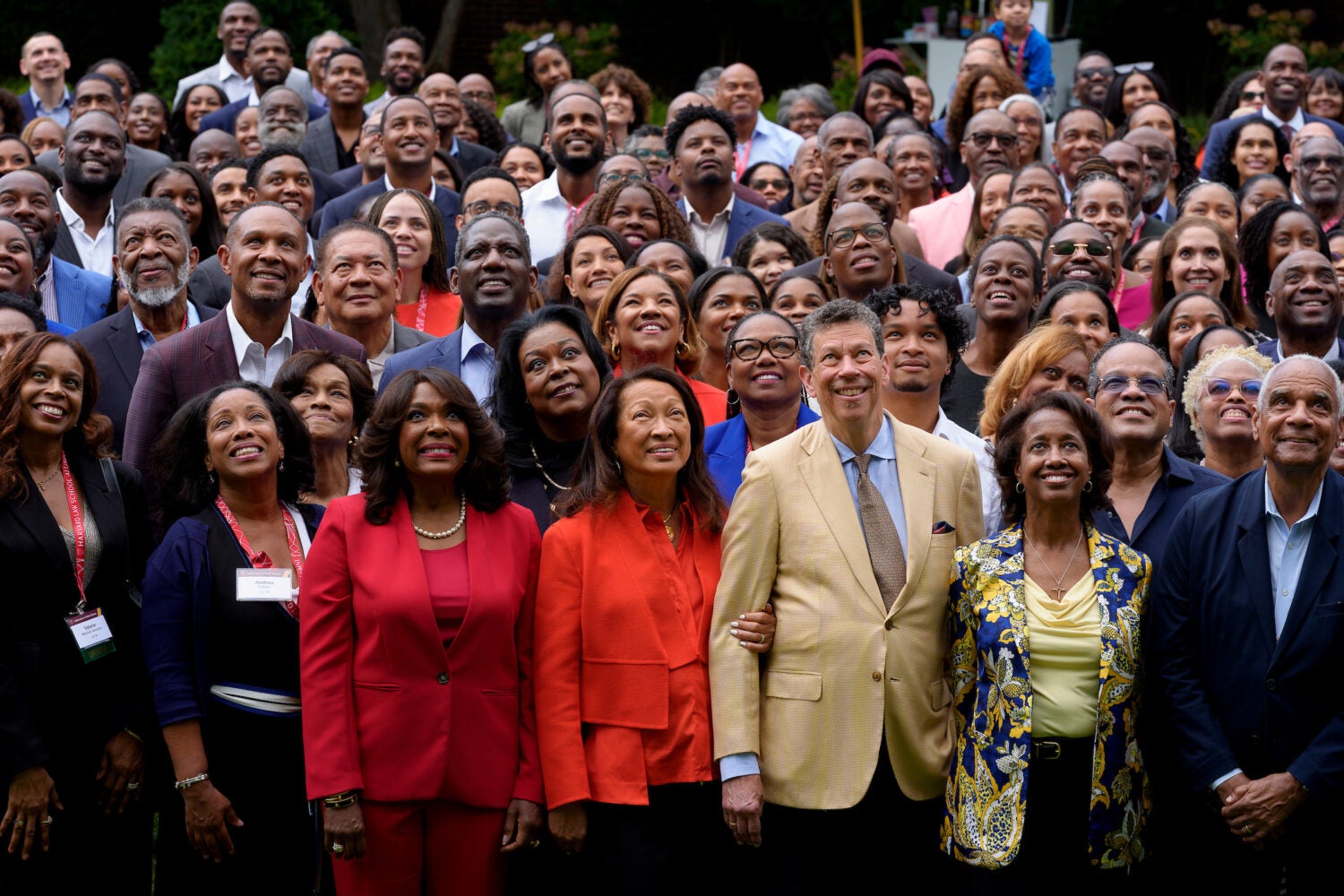At the fifth Celebration of Black Alumni on Sept. 12-14, hundreds of Harvard Law School graduates returned to Cambridge to honor the achievements and legacy of Black Harvard lawyers. The three-day event featured panels and speakers on topics ranging from “The Impact of Harvard’s Black Lawyers” to “AI and Civil Rights.”
Among the weekend’s highlights were the conferral of awards to, and remarks by, Equal Justice Initiative founder Bryan Stevenson ’85, Howard Law Professor Sherrilyn Ifill, founder of Howard’s 14th Amendment Center for Law & Democracy, and United States Supreme Court Justice Ketanji Brown Jackson ’96, who was honored as a “steadfast defender of the Constitution.”
Inaugurated in 2000 by David Wilkins ’80, the Lester Kissel Professor of Law, and the late Harvard Professor Charles Ogletree ’78, the Celebration of Black Alumni reunion series was subsequently held in 2005, 2011, and 2016. The events honor the contributions of Black Harvard Law graduates across law, government, business, and global affairs since the graduation of George Lewis Ruffin in 1869. In addition to formal programming, the alumni-funded weekend offered all Harvard Law community members an opportunity to gather socially and to connect with peers across generations, legal specialties, and career paths.
“Harvard has graduated more Black lawyers than any other law school apart from the great Howard School of Law, graduates who have gone on to become leaders in virtually every sector of society, including as president and first lady of the United States,” said Wilkins, who is also Harvard Law’s vice dean for global initiatives on the legal profession and director of the school’s Center on the Legal Profession. “This legacy of excellence and accomplishment stands as a powerful testament to the importance of keeping the doors of opportunity open for talented students from all backgrounds for achieving the Law School’s core mission, proudly embodied by our new shield, of creating a diverse and pluralistic community that trains leaders who will change the world for the better based on a deep commitment to law and justice.”
In addition to Stevenson, Ifill, and Jackson, the weekend featured nearly one hundred speakers and panelists, including Harvard Law School Association President Yvonne E. Campos ’88, UC Berkeley Law School Dean Erwin S. Chemerinksy ’78, Harvard Law School Dean John Goldberg, Howard Law School Professor Sherrilyn Ifill, California Supreme Court Justice Goodwin Liu, Fordham University President Tania Tetlow ’95, and Harvard University Corporation Fellow Kenneth C. Frazier ’78. Members of the Harvard Law School faculty were prominent, with nearly twenty current professors and lecturers participating as panelists and moderators.
Here are just a few of the weekend’s many highlights.
Ketanji Brown Jackson receives Harvard Law School Association Award
When she was 7 years old, Ketanji Brown Jackson ’96 memorized and recited Margaret Walker’s 1942 poem “For My People” at a county fair competition in Miami. Jackson’s parents signed her up to speak at county fairs, to take piano lessons, and for “everything that they did not have the chance to do” because “they were focused on teaching me to believe in myself and to know I could do anything I wanted.”
The U.S. Supreme Court associate justice recounted that childhood of learning and growth on Friday, Sept. 12 as she was presented with a Harvard Law School Association Award for her role as a “trailblazing jurist” and “steadfast defender of the Constitution.”
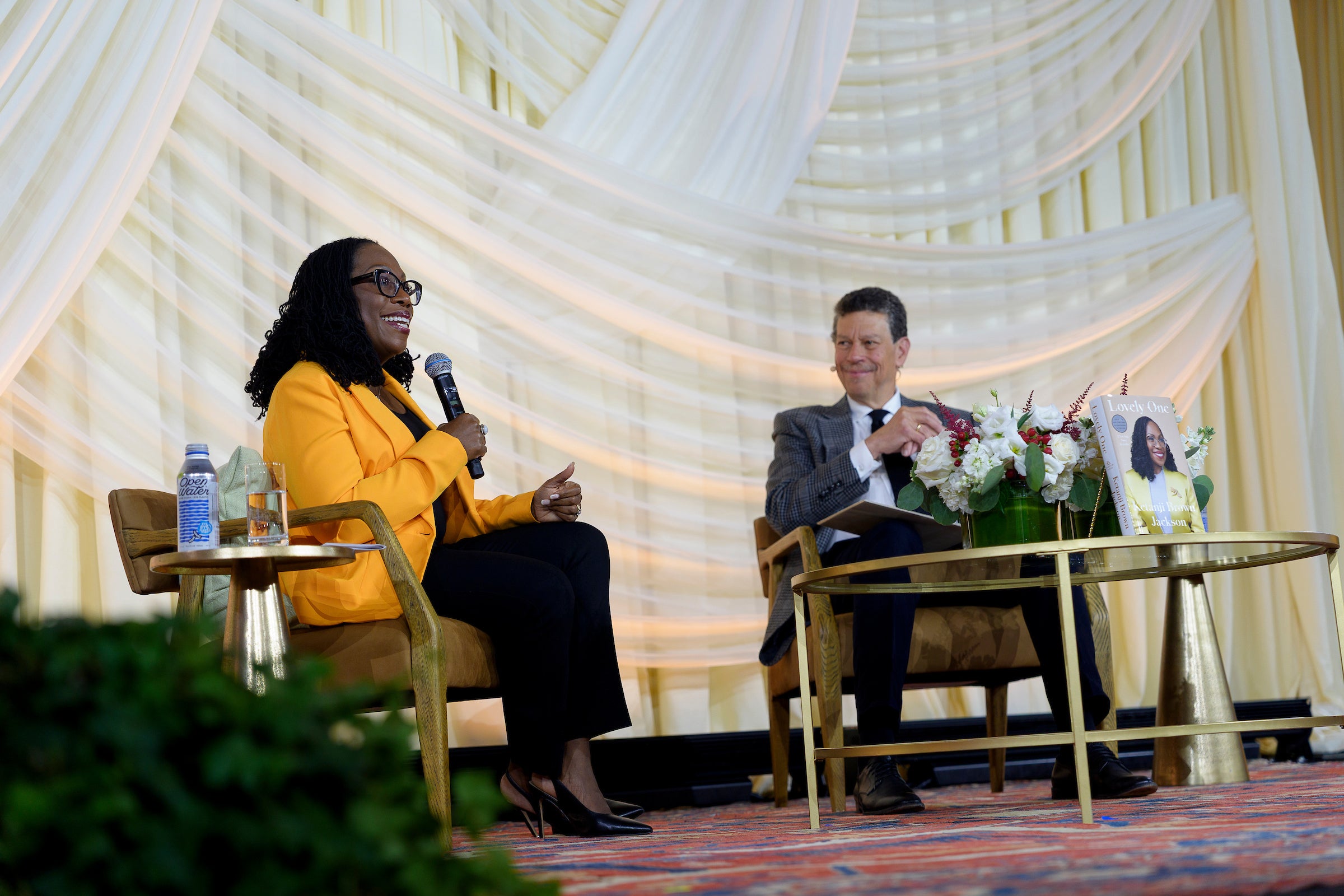
With the foundation provided by her parents — who both began their careers as public school teachers (her father later became a lawyer) — Jackson studied and worked hard, eventually reaching the Supreme Court — a “life-long dream” — when President Joe Biden appointed her in 2022 as the first Black woman justice.
During a discussion with Wilkins, Jackson shared details of her journey — including experiencing self-doubt early in her time at Harvard as an undergraduate, meeting her husband in a class taught by Harvard Professor Nathan I. Huggins, and deciding to accept the Supreme Court nomination after consulting with her family.
Jackson also read from the preface of her 2024 book “The Lovely One,” which traces her path to the high court, starting with her grandparents’ and parents’ experiences growing up in the segregated South.
Jackson earned her A.B. from Harvard-Radcliffe College in 1992 before attending Harvard Law. She later clerked for Judge Patti B. Saris ’76 of the U.S. District Court for the District of Massachusetts, Judge Bruce M. Selya ’58 of the First U.S. Circuit Court of Appeals, and Supreme Court Associate Justice Stephen Breyer ’64, who became the Byrne Professor of Administrative Law and Process at Harvard Law School after retiring from the court in 2022, yielding his seat on the bench to Jackson.
When Wilkins asked Jackson to reflect on what her clerkships meant for her career, the Justice said they were an “extraordinary training ground.”
“If you want to be a litigator, I can think really of no better training opportunity,” she said. “Because what we do as litigators is attempt to persuade a judge to rule in favor of our clients … When you have the opportunity to work with a judge, you start to see what is persuasive from the judge’s perspective … you know what arguments to make when you become a litigator.”
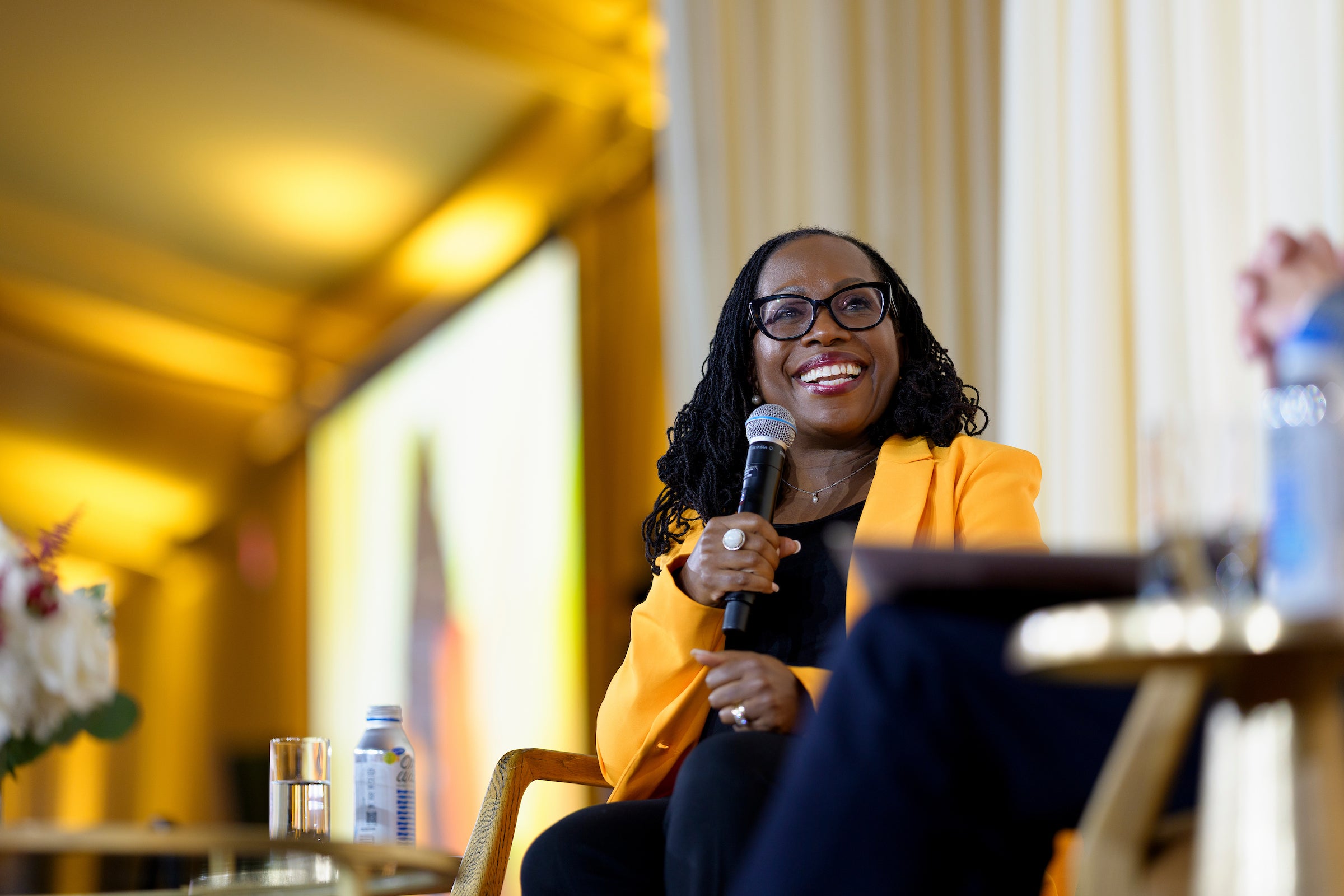
In addition to being the first Black woman justice, Jackson is the first justice to have been a public defender. After being nominated to the U.S. District Court for the District of Columbia by President Barack Obama ’91, she served there until 2021, when Biden elevated her to the U.S. Court of Appeals for the District of Columbia Circuit and later to the high court.
Writing a memoir, Jackson told celebration attendees, was a way “to mark the moment” after her appointment to the Supreme Court.
“Having gotten through a very arduous confirmation process, I was feeling very grateful — very grateful — and that gratitude led me to think about the people and the circumstances that I felt were most responsible for the success that I had achieved,” she said.
Despite her accomplishments as a young person, Jackson felt out of place when she first arrived at Harvard in 1988. She was especially sad as her 18th birthday approached in mid-September with no one to help her celebrate. One night, another Black woman she did not know leaned in and told her to “persevere” as they passed each other walking through Harvard Yard.
“I’ll never forget that,” Jackson said. “She gave me something to hold onto.”
Harvard is also where Jackson met her husband, Patrick. She said their relationship is a testament to the good that can come when universities bring together people from different life experiences and backgrounds.
“It was extraordinary to come to a place like Harvard and meet someone who had a background that was totally different from mine … my husband was descended from nobility. At the time we met in college, he was seventh-generation Harvard,” she said, prompting laughter throughout the crowd. “He’s a Boston Brahmin — that’s a real thing. And I was, of course, second generation any college.”
Although her eventual nomination to the Supreme Court was the opportunity of a lifetime, accepting it was a decision she discussed with her family.
“It changes your entire life to be a public figure,” she said. “You can’t move through the world in the same way; you don’t have the same freedom to do what you want to do in the spirit of the moment. We really had to take a moment as a family… to come to terms with: Were we ready for this? … The most important thing is your family, and you need the support of the people in your family if you’re going to actually do this job successfully.”
In opening remarks, Dean Goldberg thanked the celebration’s organizers, participants, financial supporters, and attendees, noting that he was looking forward to a weekend of both social and intellectual engagement with alumni, faculty and current students from an array of backgrounds, experiences, and perspectives in order “to learn and grow together.”
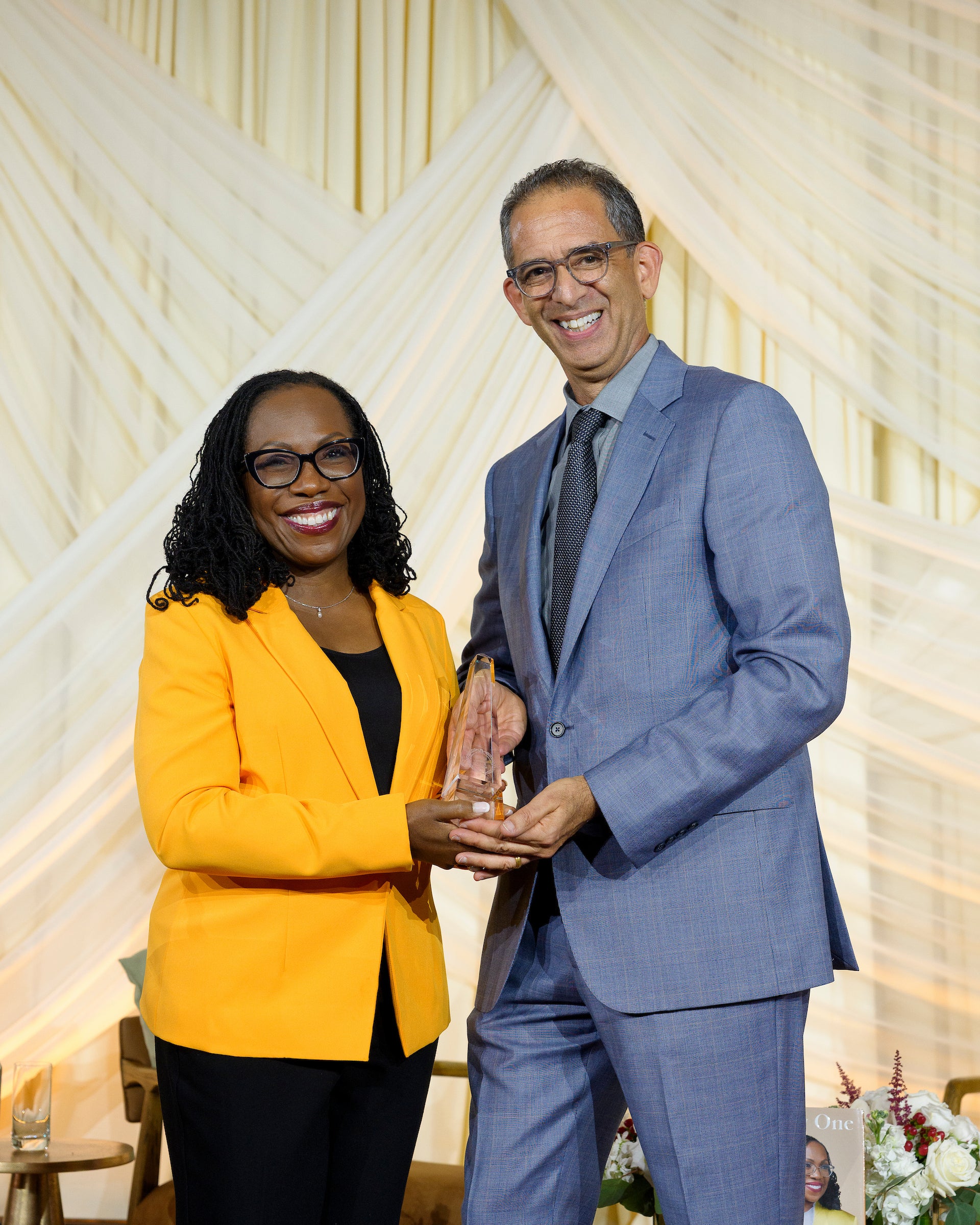
Harvard Law School Association Executive Committee member and Awards Committee Co-Chair Jee Young You ’05 introduced Jackson at the event and presented her with the award, which is given annually to people who have provided extraordinary service to the legal profession, to society, or to the law school. Past recipients include Kenneth Chenault ’76; Barack Obama ’91; Harvard Law School Professor Annette Gordon-Reed ’84; and Wilkins.
Celebration Award Recipients!
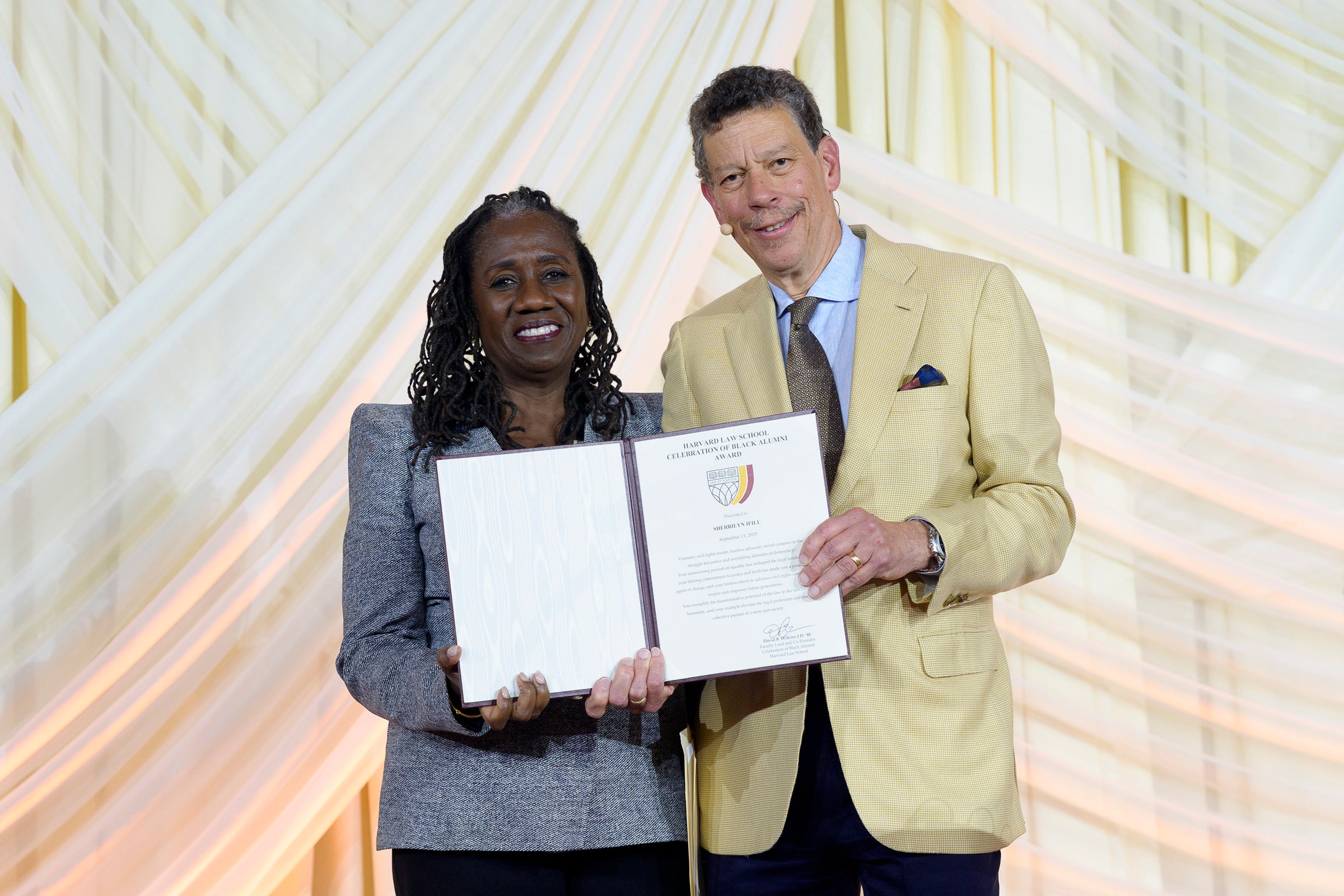
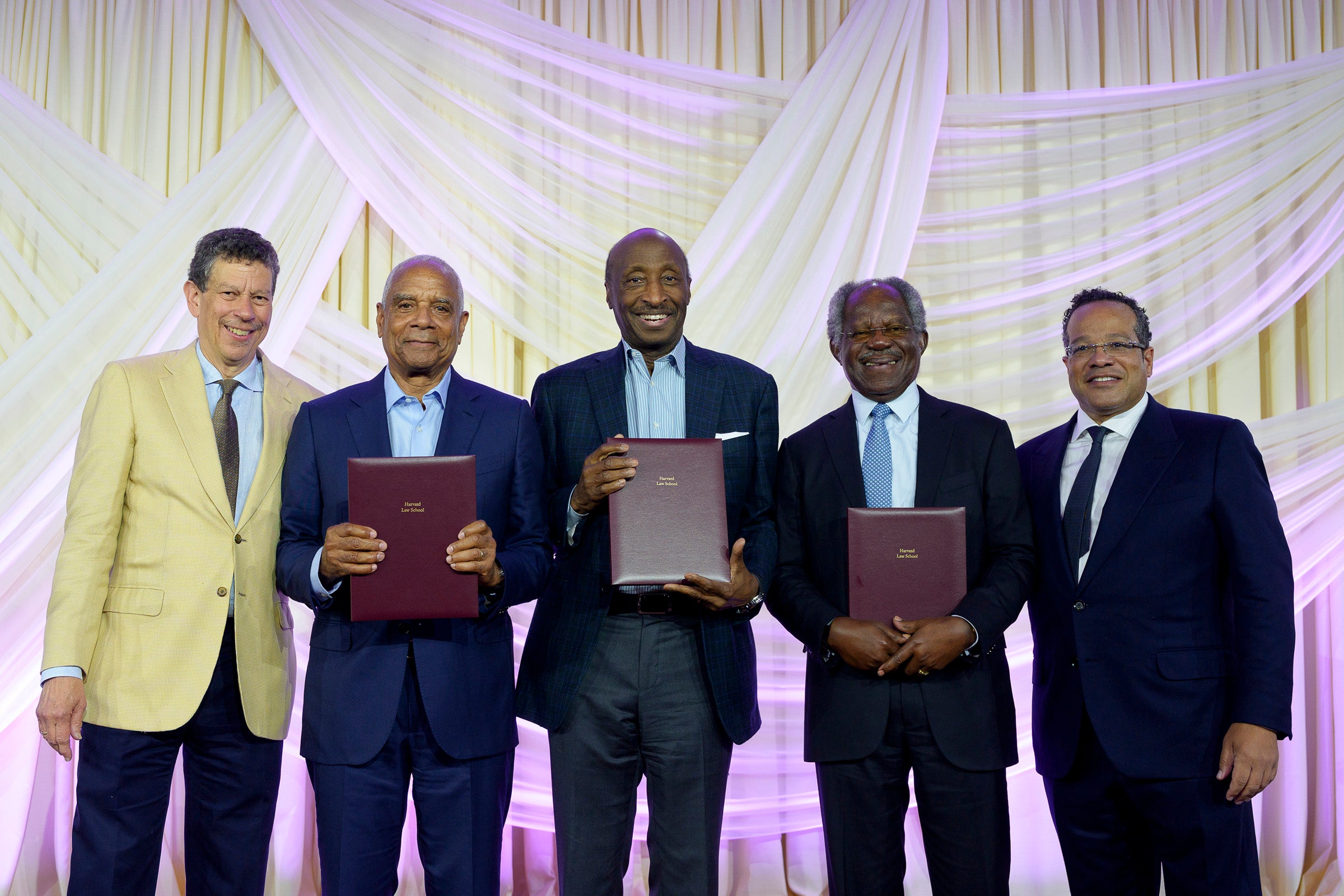
During this year’s Celebration of Black Alumni, four distinguished Harvard Law affiliates — Sherrilyn Ifill, Kenneth I. Chenault ’76, Kenneth C. Frazier ’78 and Adebayo O. Ogunlesi ’79 — were honored with the Harvard Law School Celebration Award: (Photo left) Sherrilyn Ifill, the Vernon Jordan Distinguished Professor of Civil Rights and founder of the 14th Amendment Center for Law & Democracy at Howard University School of Law; (Photo right) Harvard Law Professor David Wilkins ’80, Kenneth I. Chenault ’76, chairman and managing director of General Catalyst, a fellow of Harvard Corporation, and the former chairman and CEO of American Express; Kenneth C. Frazier ’78, retired chairman and CEO, Merck & Co., chairman, health assurance initiatives of General Catalyst and a fellow of Harvard Corporation; and Adebayo O. Ogunlesi ’79, chairman and CEO Global Infrastructure Partners, BlackRock. [pictured with Dale LeFebvre ’98, executive chairman and founder, 3.5.7.11]
Bryan Stevenson receives Charles Hamilton Houston Medal of Freedom
The most harmful legacy of slavery is not the trauma that enslavers and their enablers inflicted on Black people and their descendants but a “false narrative” that “Black people are not as good as white people,” renowned public interest lawyer and Equal Justice Initiative founder Bryan Stevenson ’85 said in his keynote address on Saturday, Sept. 13.
“That, to me, was the lasting and enduring evil of slavery,” said Stevenson.
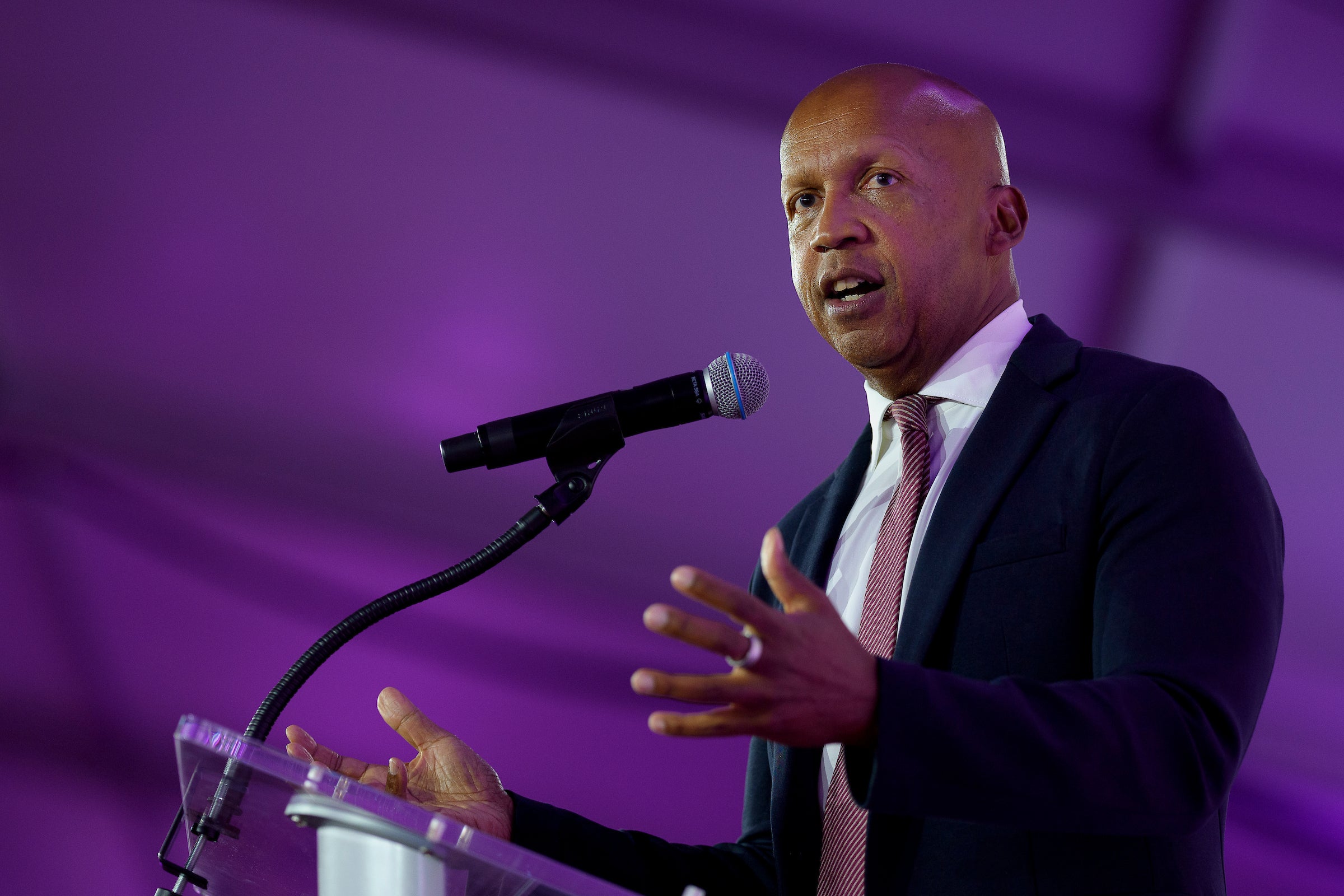
Dismantling that narrative, he said, will require a commitment to truth telling and history that this country has never fully embraced and that some people and politicians have actively tried to prevent.
In 1989, Stevenson founded the Equal Justice Initiative, a nonprofit that provides legal representation to people illegally convicted, unfairly sentenced, or abused in jails and prisons. Since then, he and his team have successfully represented more than 100 wrongfully condemned people on death row, among other cases.
Stevenson and the initiative also have worked to change the conversation about race in the U.S., including by creating and operating three institutions in Montgomery, Ala. — the Legacy Museum, the National Memorial for Peace and Justice, and the Freedom Monument Sculpture Park — that invite visitors to confront some of the nation’s racial injustices, including slavery, segregation, lynchings, mass incarceration, and racial bias.
For his continuing efforts toward racial justice, Stevenson was awarded the Charles Hamilton Houston Medal of Freedom.
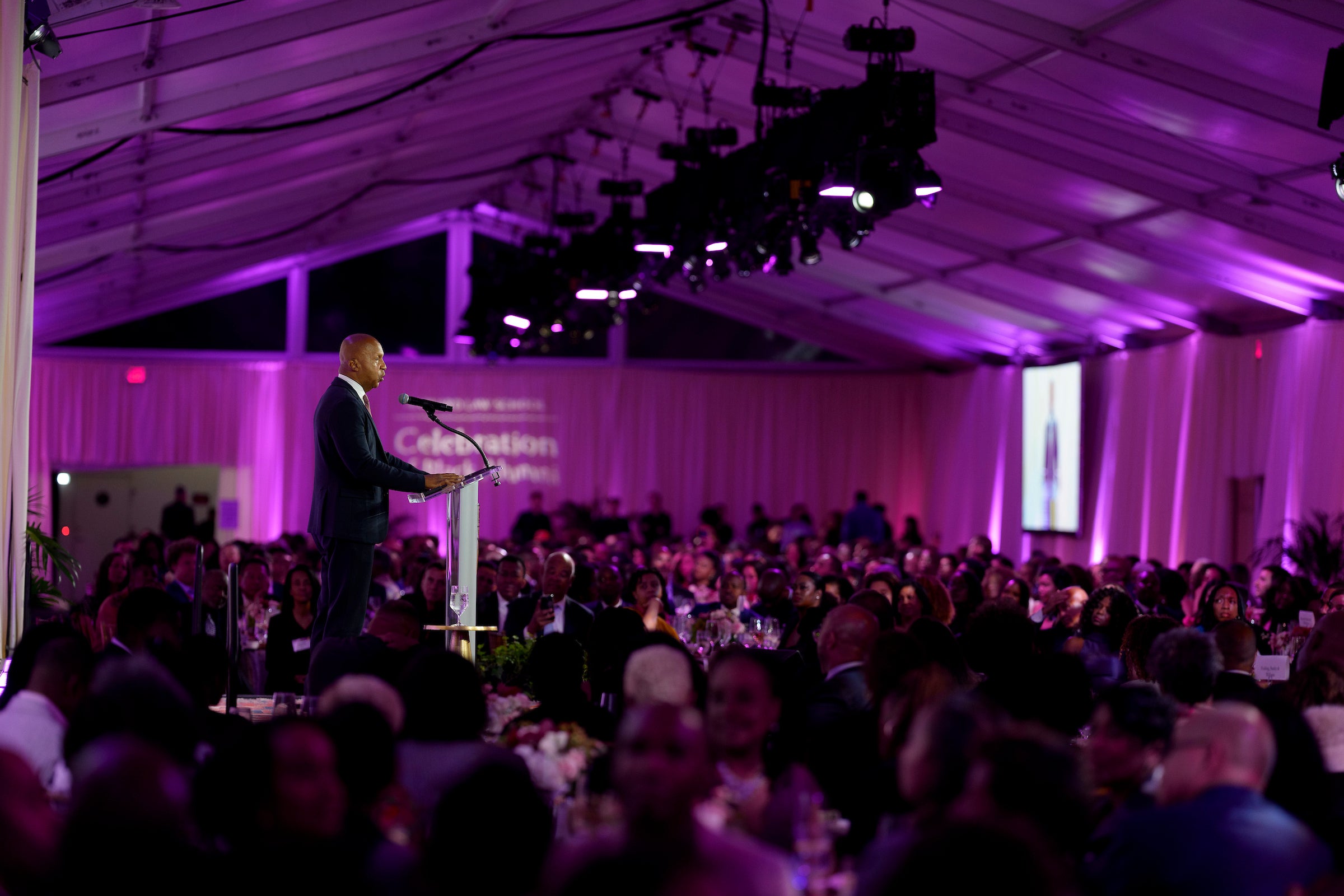
In his remarks after receiving the award, Stevenson called on his fellow Harvard Law alumni to join him in his work as an advocate for marginalized communities and people as well as in confronting racism. He contrasted the U.S. to countries such as South Africa and Germany that have adopted formal mechanisms to acknowledge, study, and repair harms from past atrocities.
“You can’t graduate from high school in Germany without a detailed knowledge of the Holocaust,” he said. “They don’t have people saying, ‘Oh, we can’t teach our children about the Holocaust; that might make them uncomfortable or ashamed’ … There are no monuments or memorials to the perpetrators of the Holocaust. The absence of that [commitment] in this country is a problem … This is a struggle that will define what happens next.”
Stevenson, a successful litigator, law professor, and best-selling author of “Just Mercy,” has received numerous awards and recognition for his work. His most notable Supreme Court wins include Madison v. Alabama, which prohibited death sentences for people who cannot understand the reason for their execution, and Miller v. Alabama, which bars imposition of mandatory life sentences without the possibility of parole for juveniles.
In his remarks, he shared his own experiences with the country’s narratives about Black people, including the time he traveled to a county in the Midwest to represent a defendant in post-Miller proceedings. When the judge saw him sitting at the table for defense counsel, he told Stevenson to leave, saying defendants shouldn’t be in the courtroom without their attorney. When Stevenson introduced himself, the judge laughed.
“But it wasn’t an apology,” Stevenson recalled. “And the prosecutor started laughing, and it made me angry … I thought, ‘Oh, Bryan, you’re going to have to smile. You’re going to have to laugh.’
“And I thought that because I knew I could leave that county and never come back, but my client was not going to be able to leave that county, and so I smiled … I’m still required to laugh at my own humiliation to do justice for my client … When you have to navigate a presumption of incompetence, when you’re never able to insulate yourself from these perceptions that you are less than because of your color, it is exhausting. It’s exhausting,” he said. “And that is why I am so committed to an era of truth and justice.”
Stevenson was introduced by Cathleen Price ’96, an attorney who started her career at the initiative and continues to work with it. Price said that, in addition to changing the public narrative around race in the U.S., Stevenson has made the initiative a place where Black people can “be witnessed.”
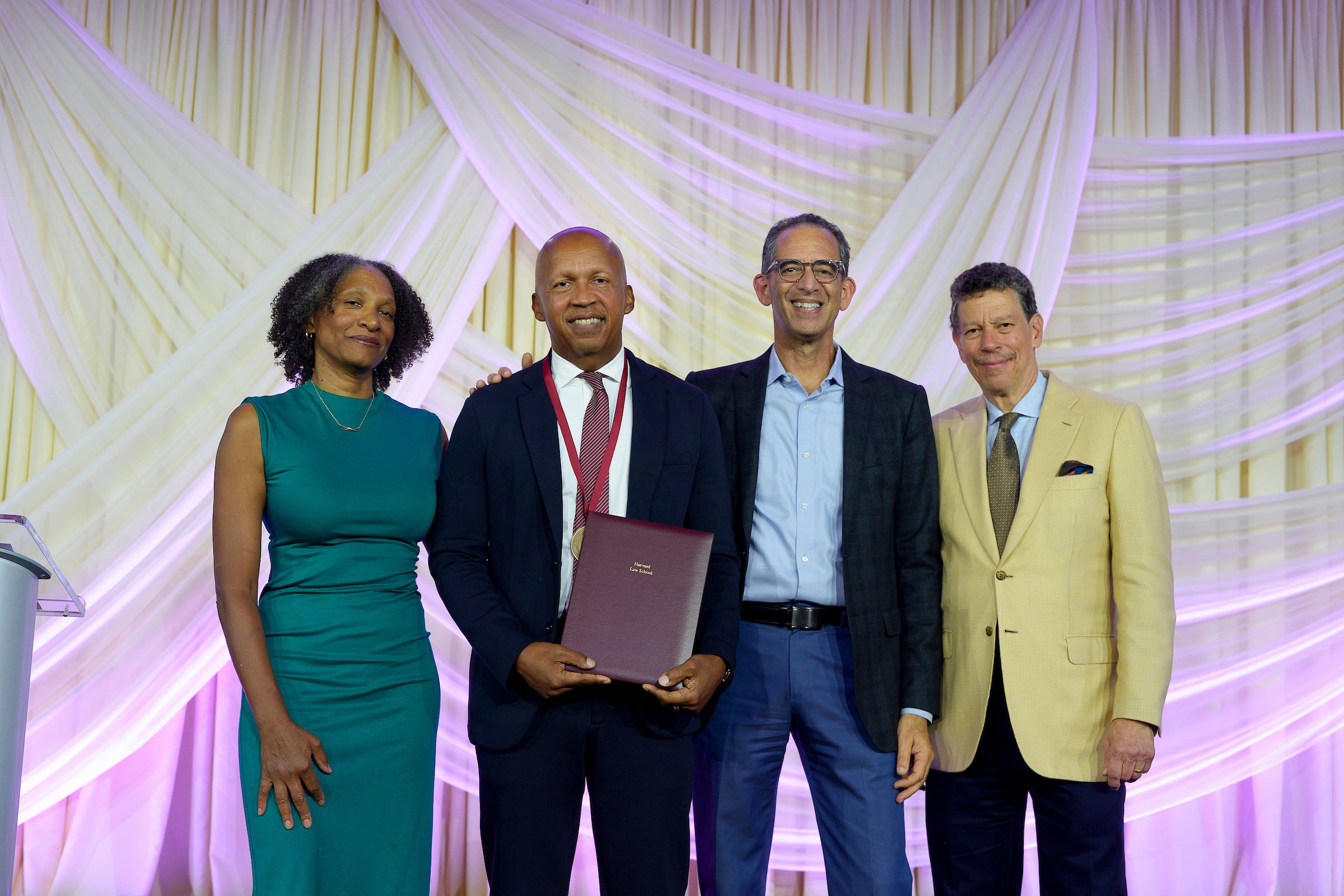
“You’ve given so much to the world with your narrative work and storytelling … but the witnessing is something that you’ve given to us,” she said.
Professor Wilkins shared the history of the Charles Hamilton Houston Medal of Freedom, which is named for the 1920s Harvard Law graduate who was the NAACP’s first general counsel and became known as “the man who killed Jim Crow.”
In his introductory remarks, Dean Goldberg called Stevenson a “shining beacon.”
“You have made immeasurable strides in criminal justice reform and racial justice, come to the aid of those in need from inmates on death row to families living in poverty,” Goldberg said. “You have indelibly altered the lives of countless individuals and shaped a movement that will touch the lives of generations to come.”
Stevenson said he was grateful to receive the award but more excited to invite people to participate in racial justice work.
“We now have to equip ourselves for a narrative struggle,” he said. “This is a critical moment in American history. We’re going to have to say more than we’ve been comfortable saying; we’re going to have to do more than we’ve been comfortable doing. There is this very dangerous idea floating that we should forget the past, not talk about this history. I think we’ve got to do the opposite.”
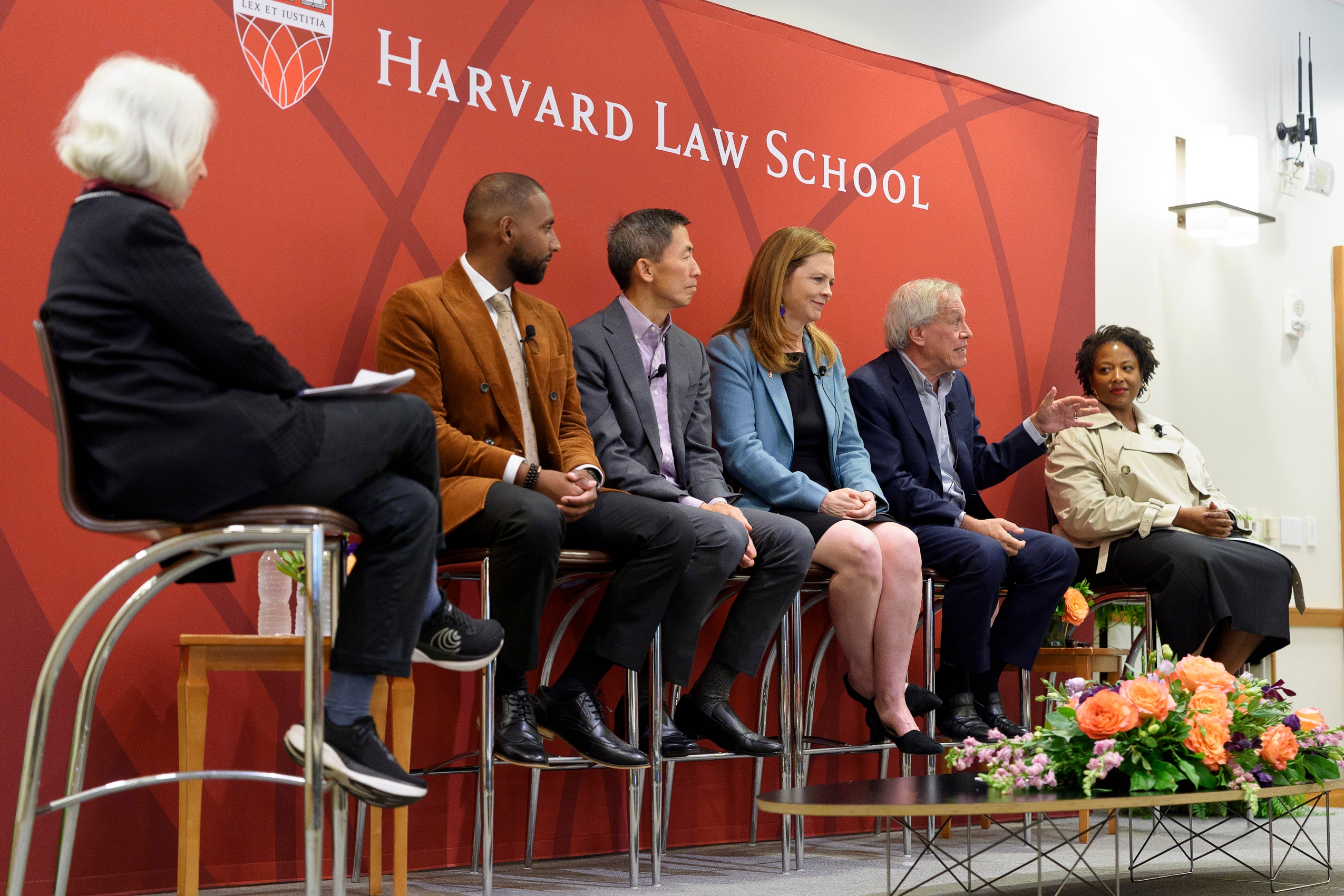
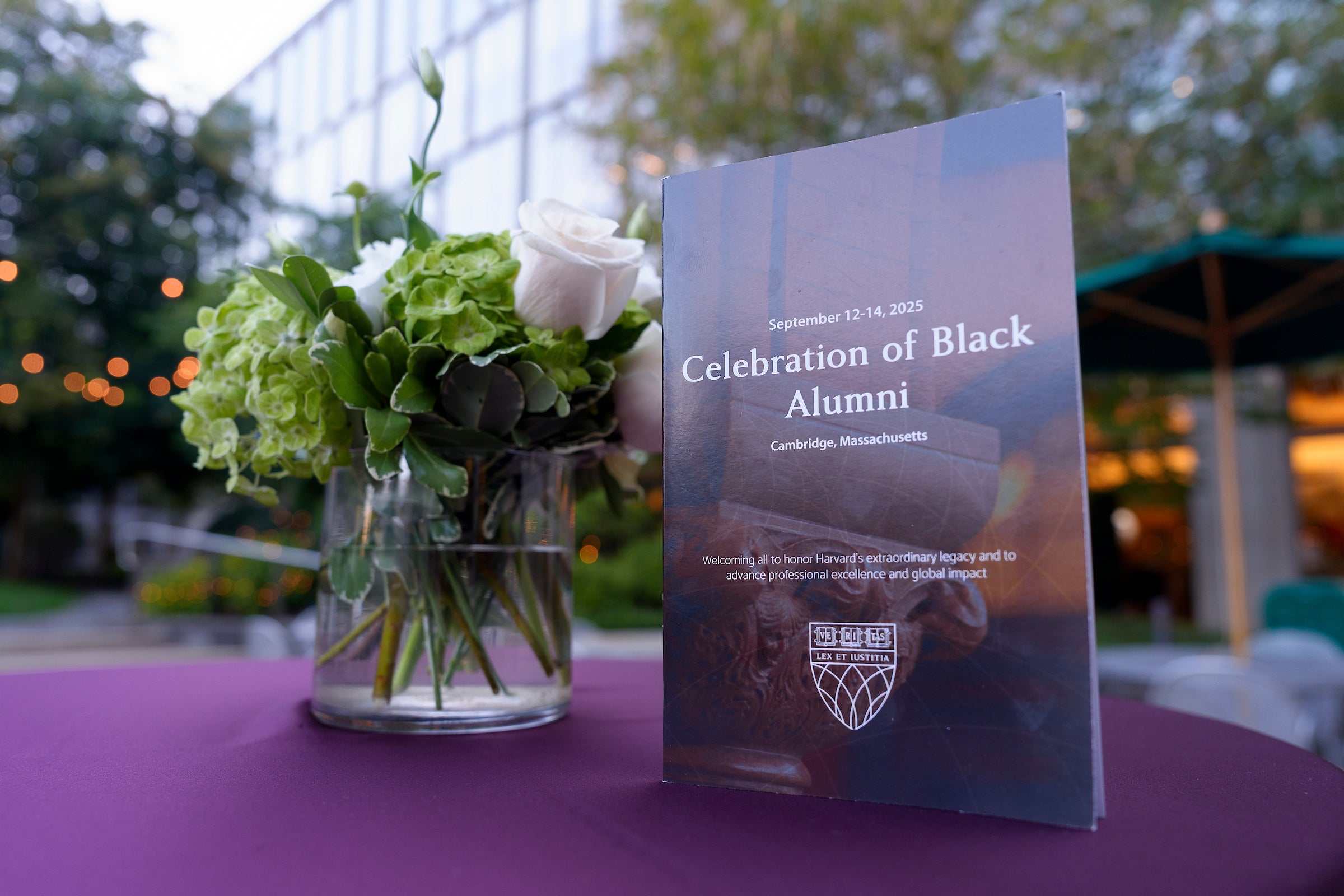
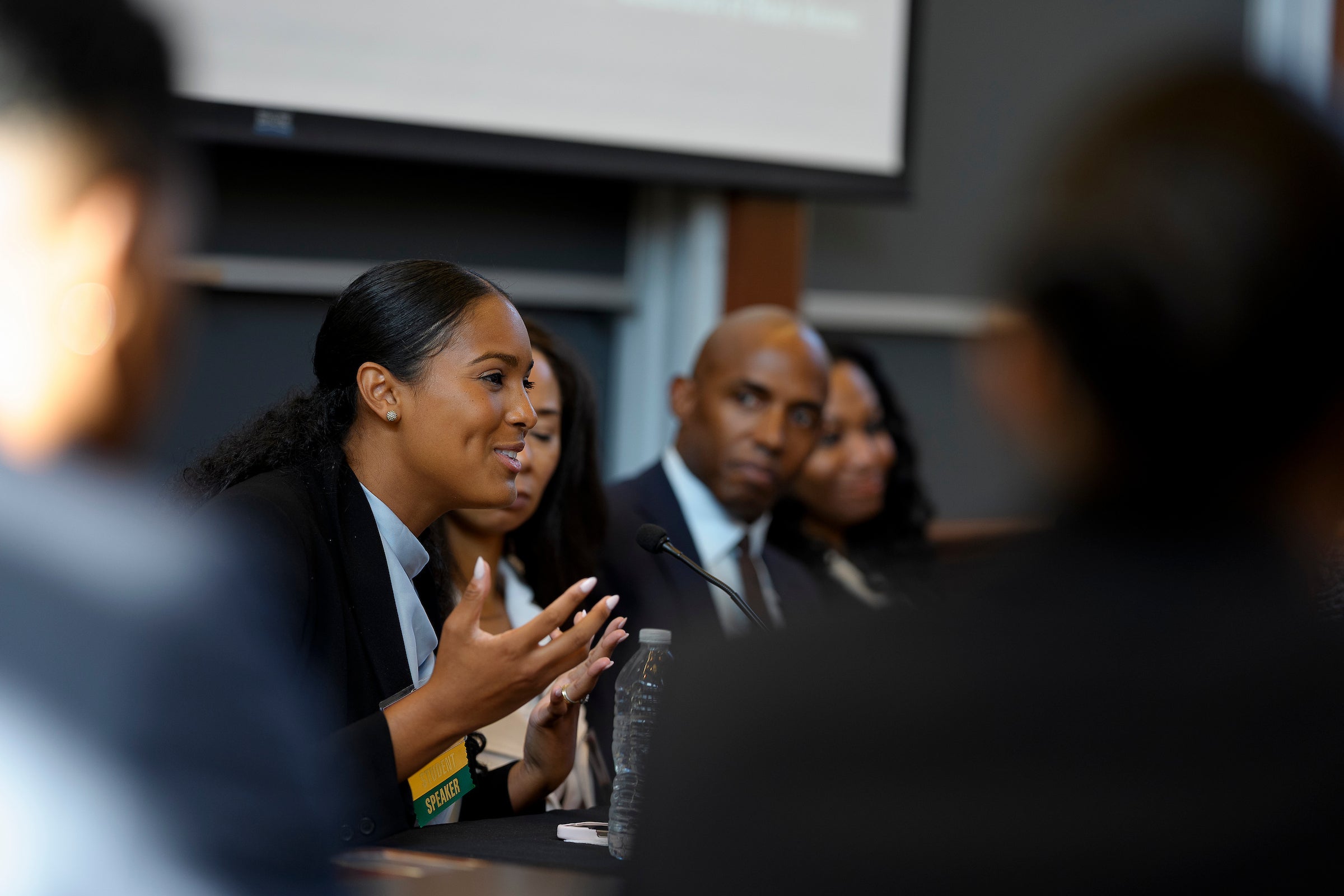
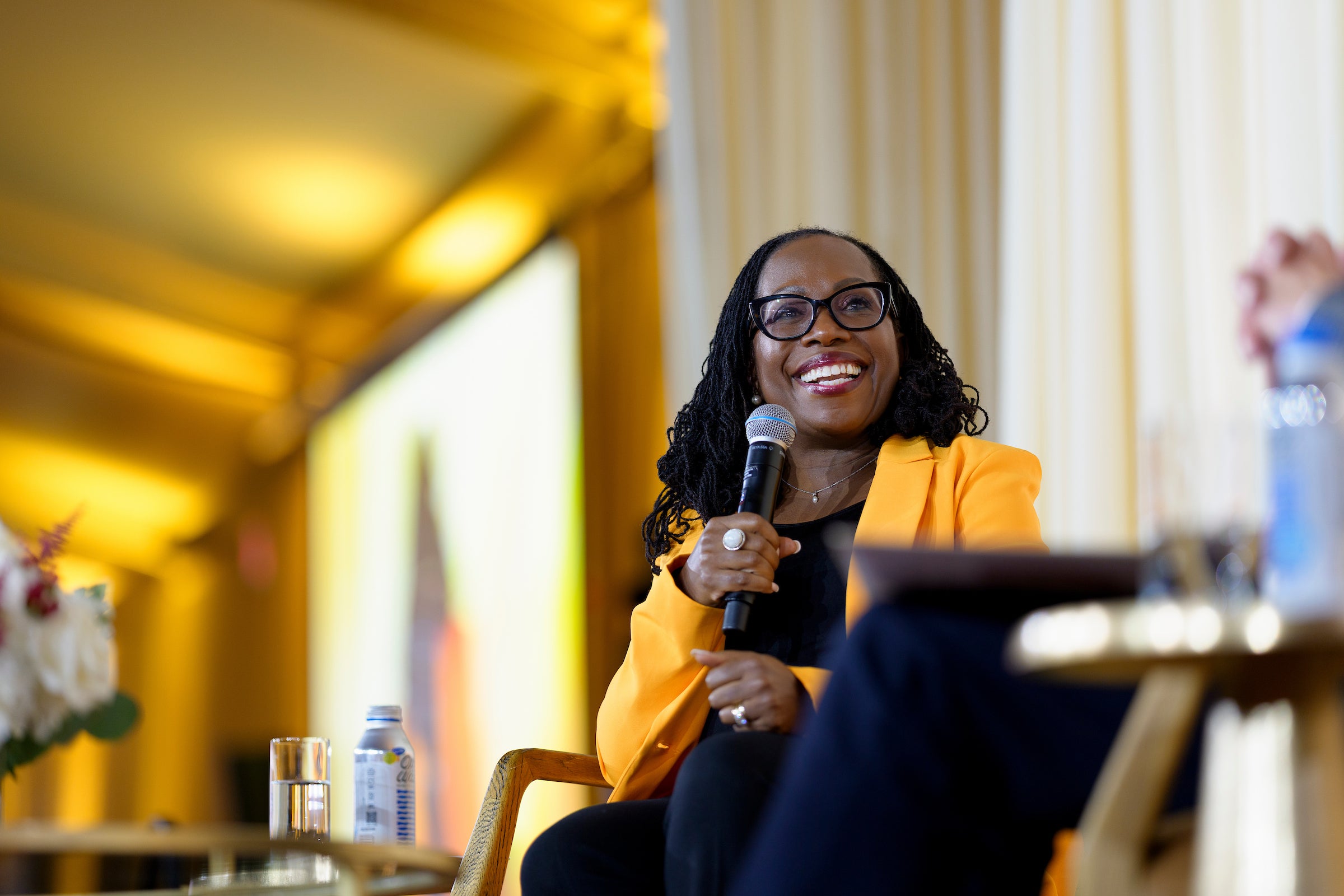
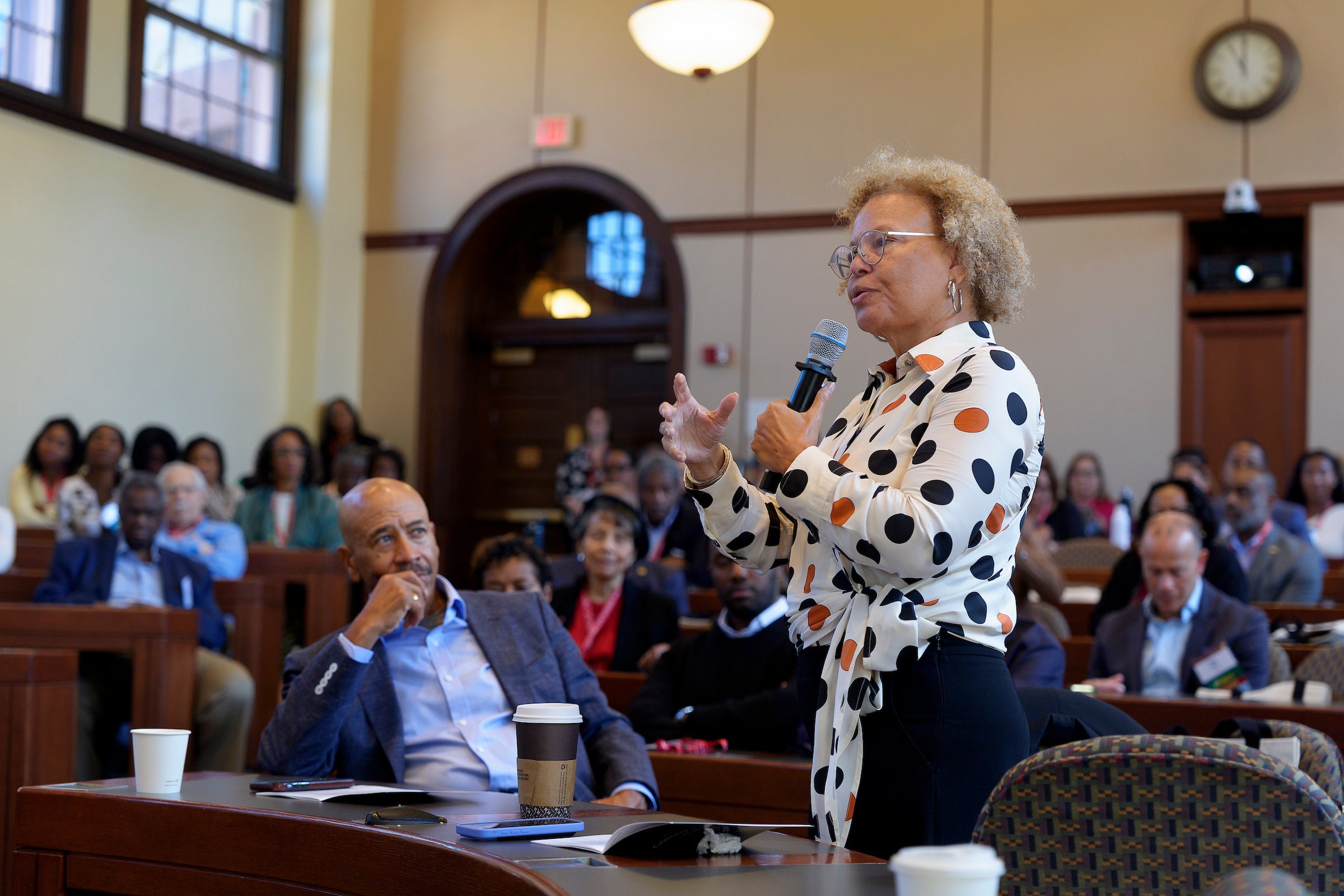
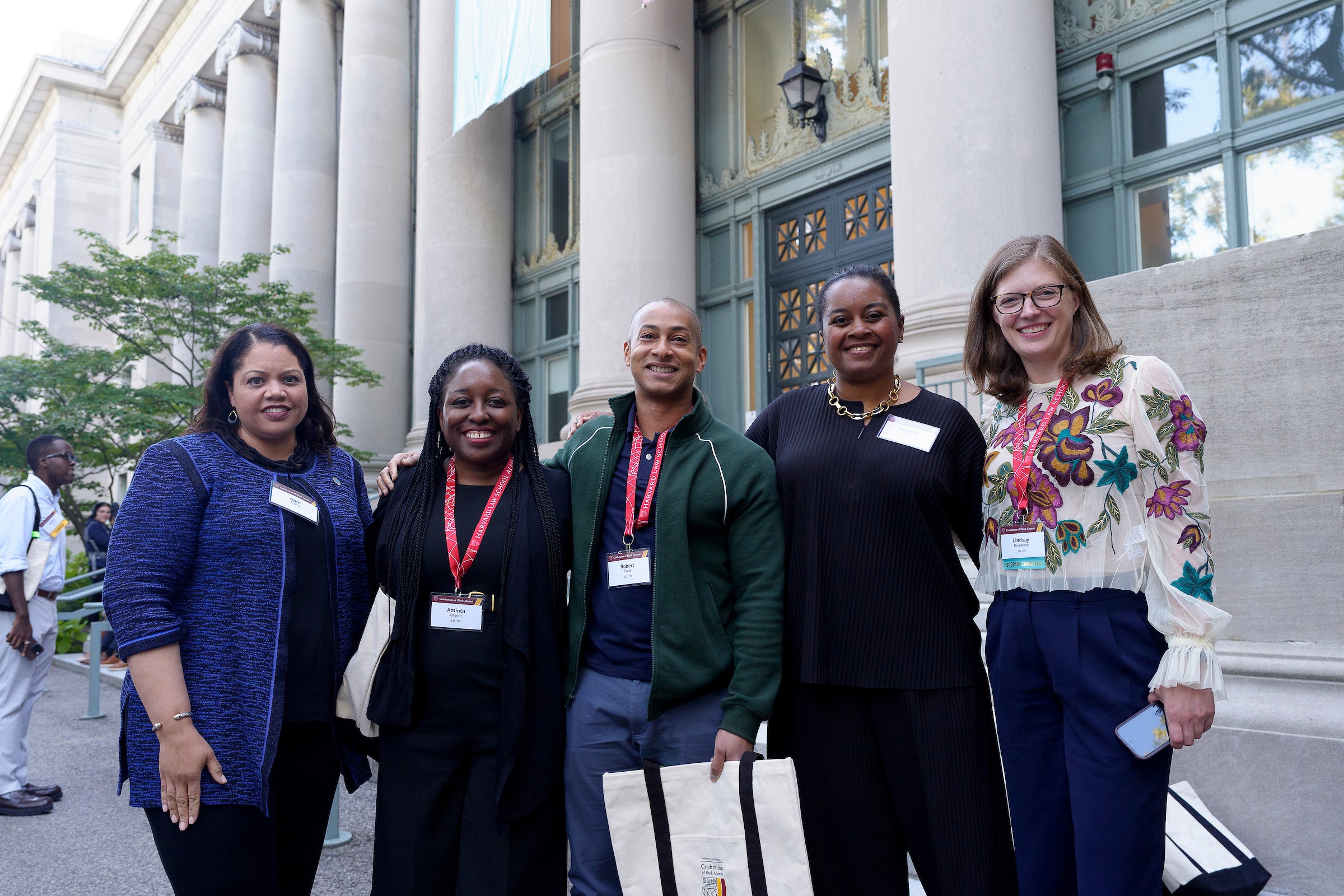
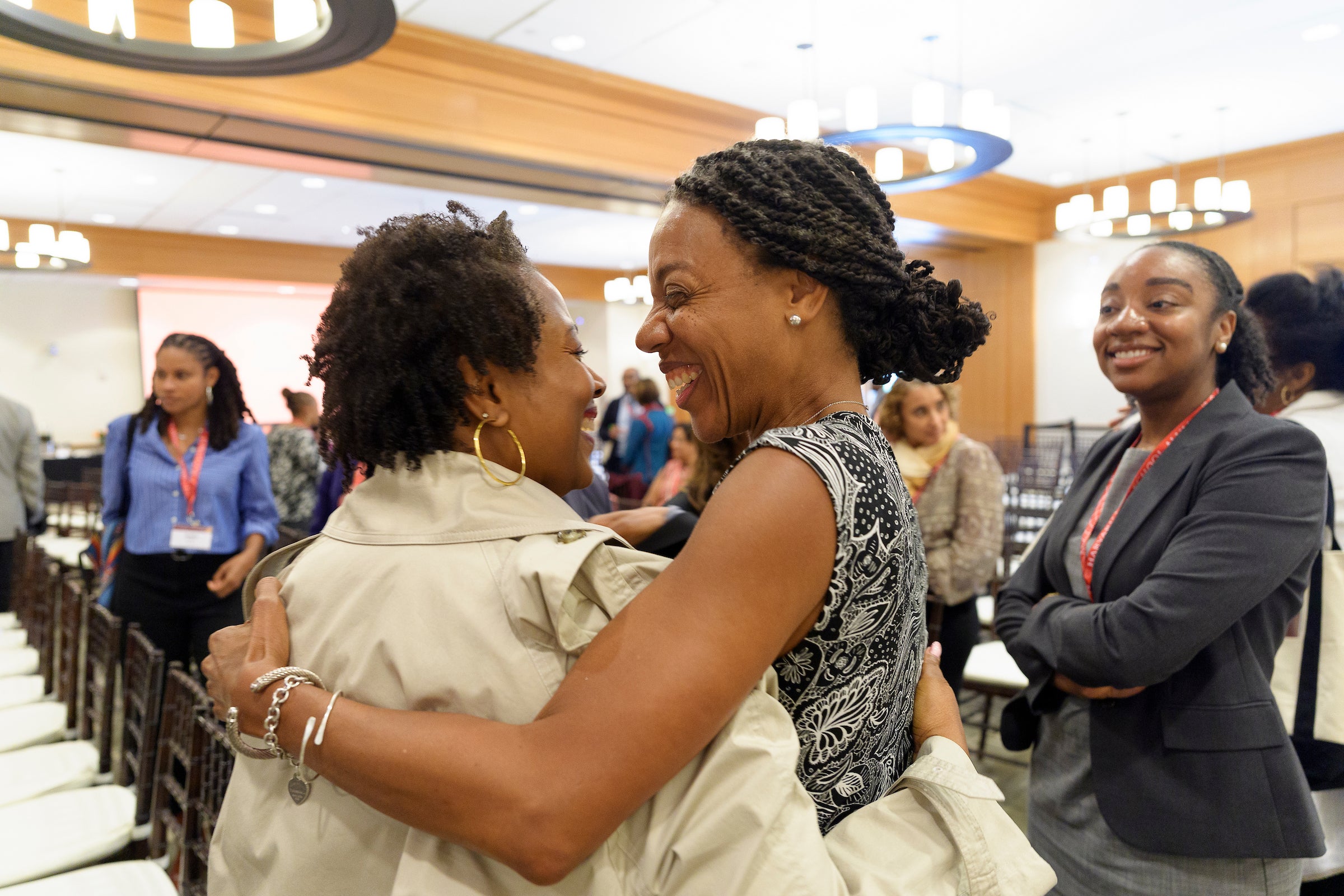
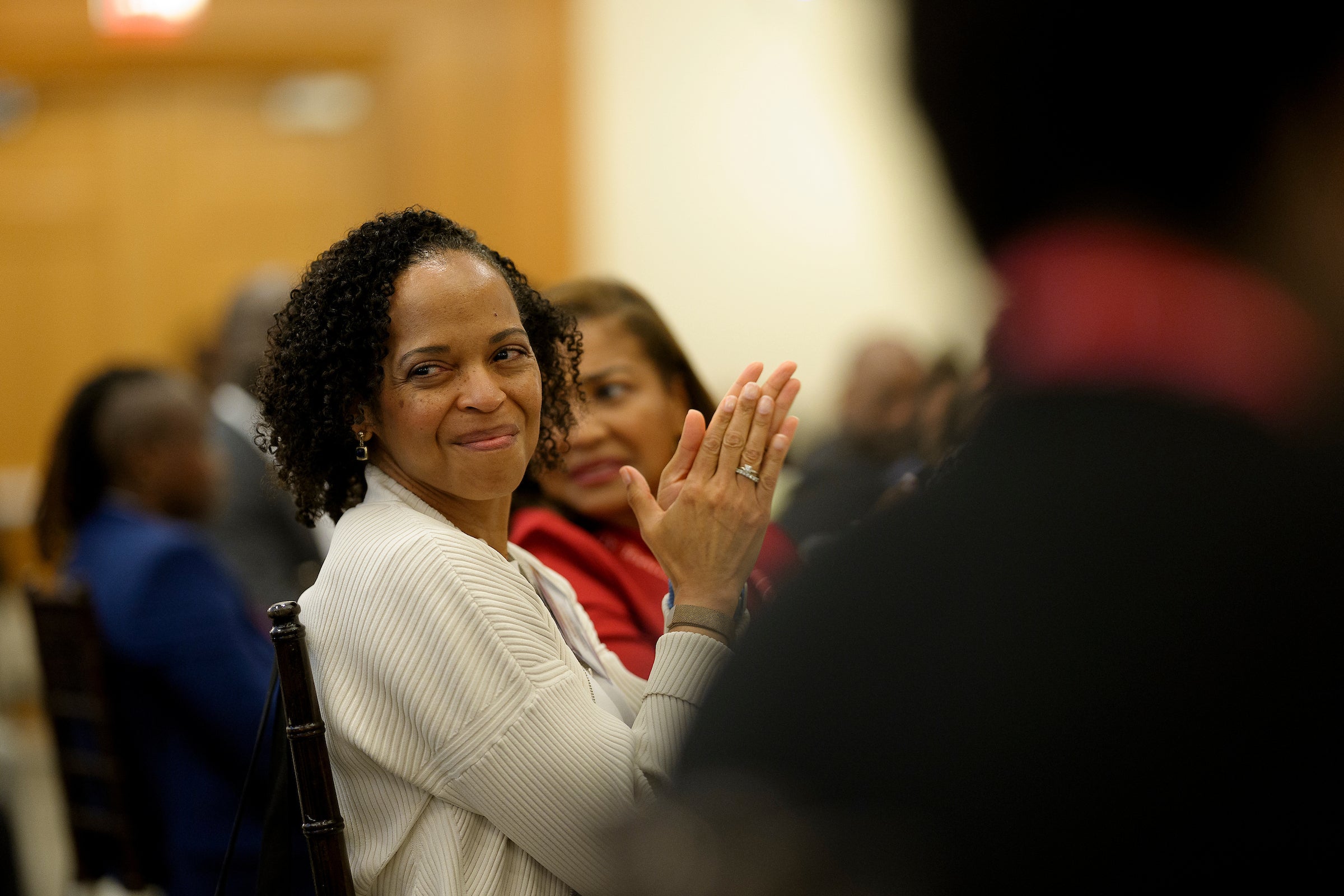
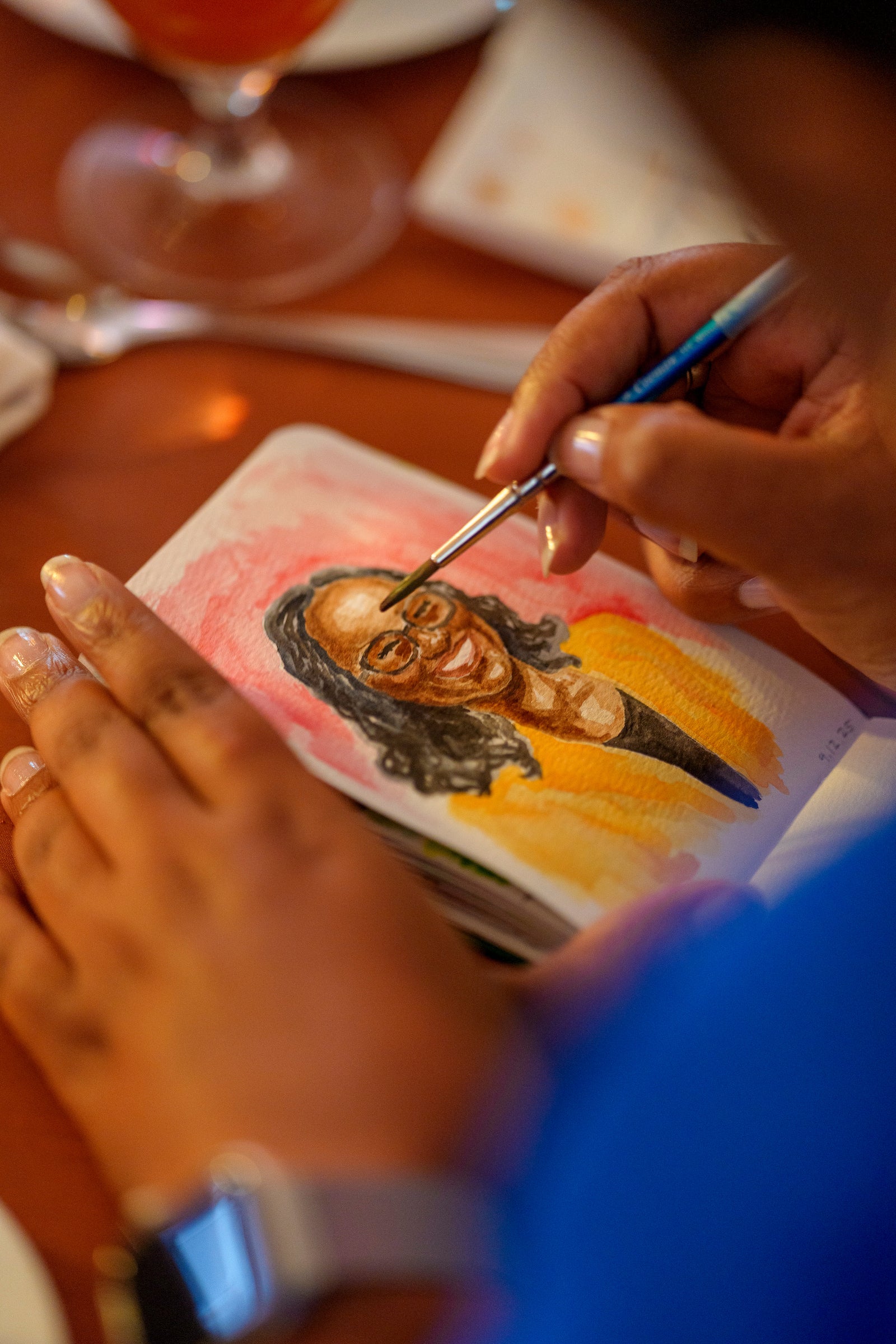
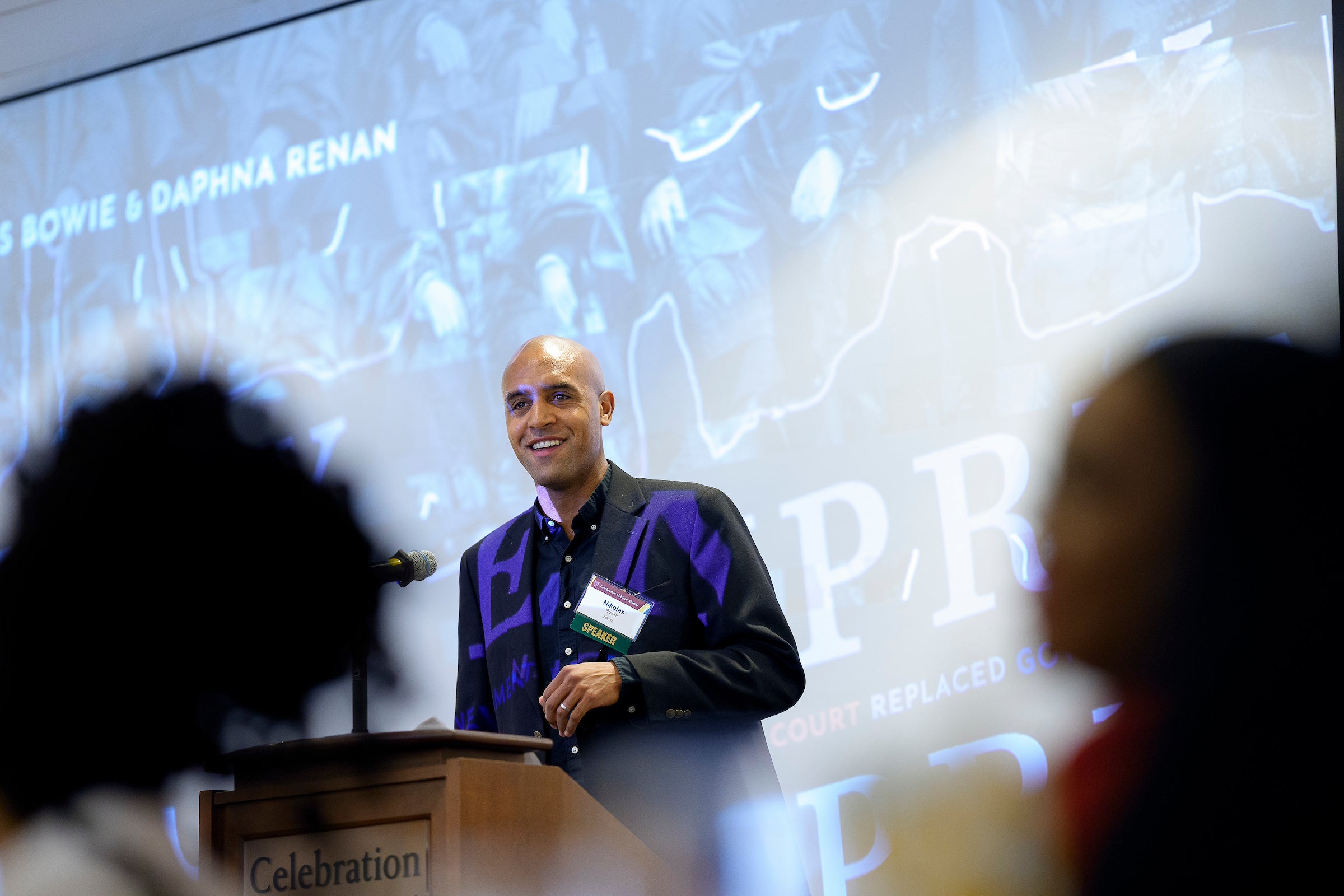
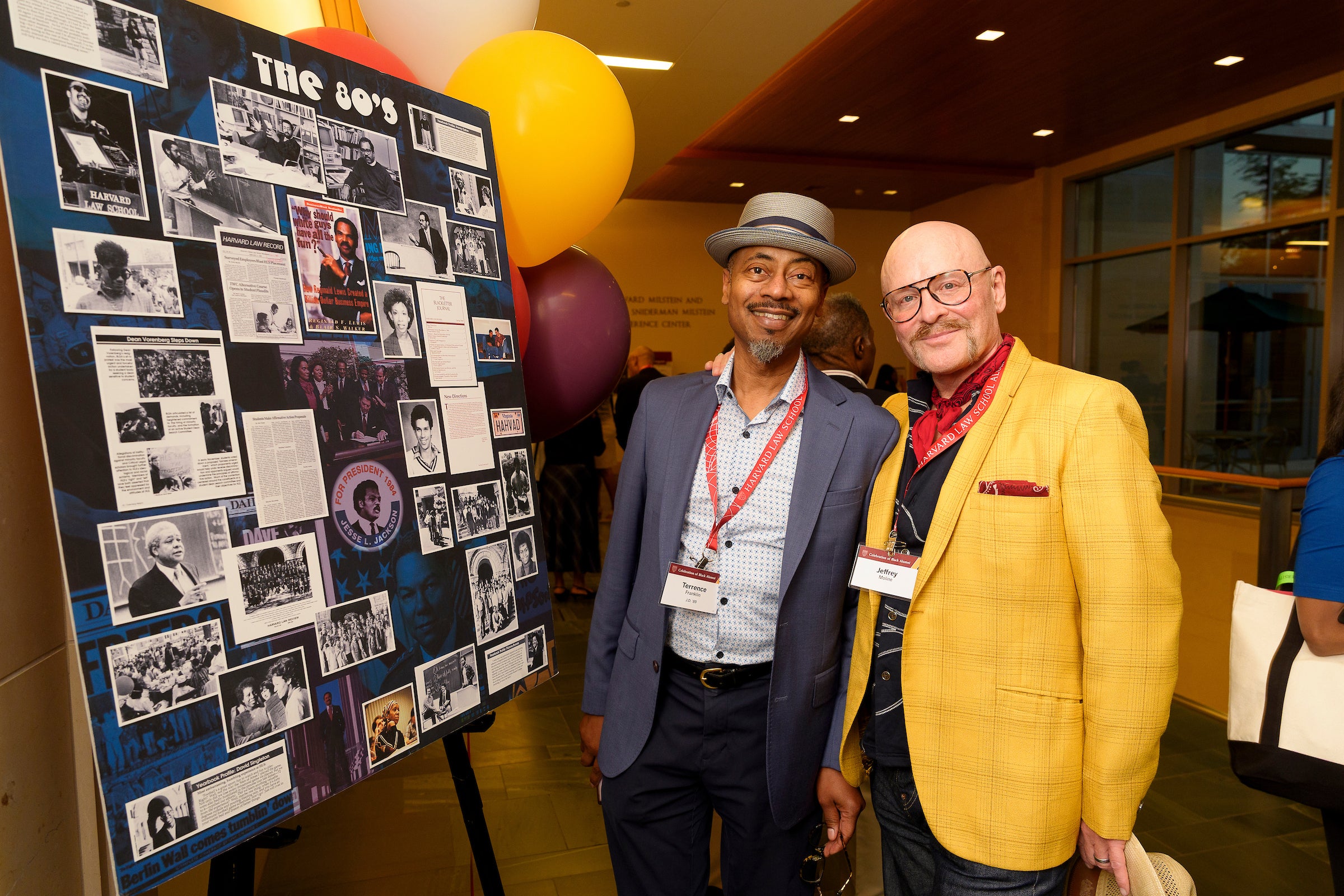
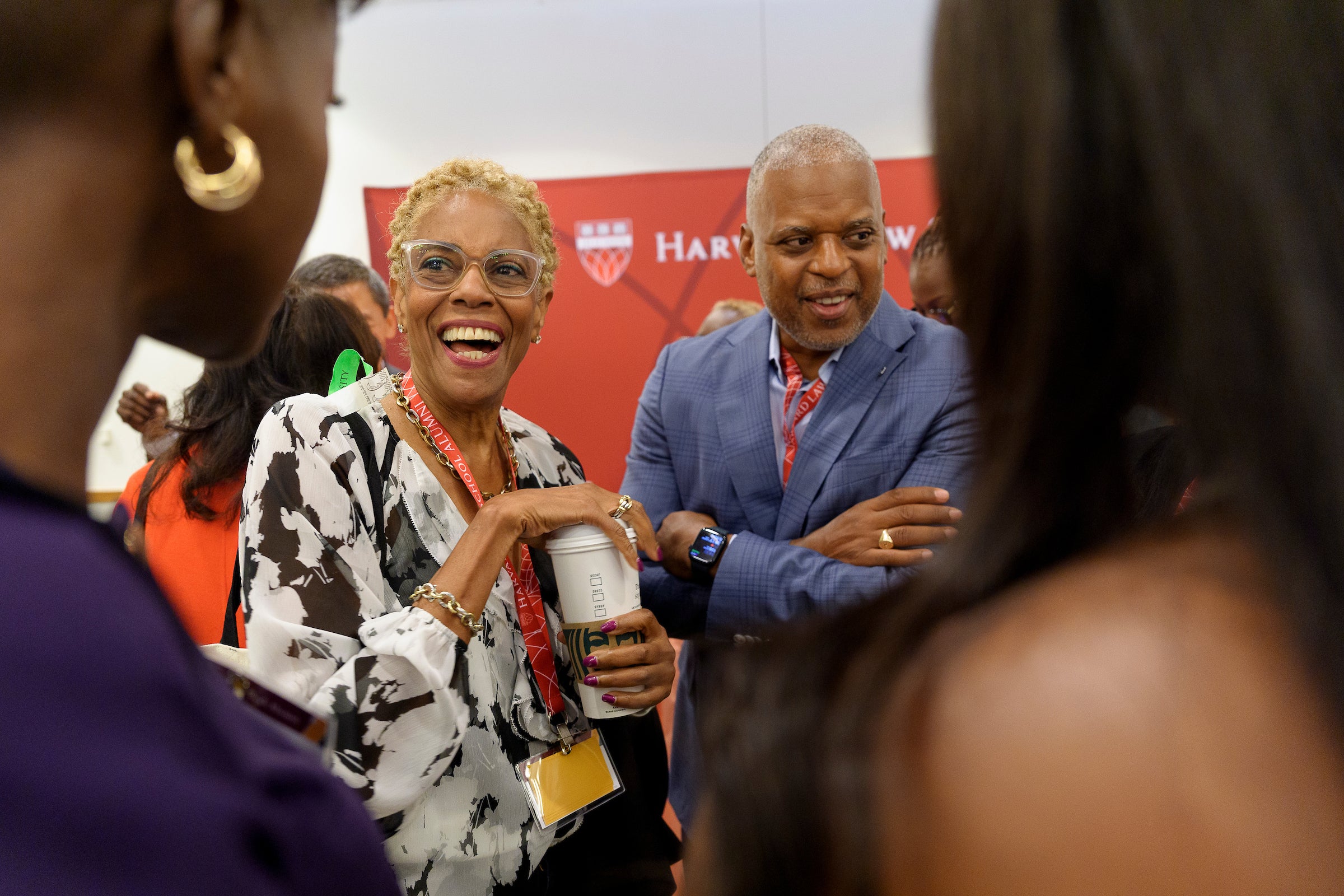
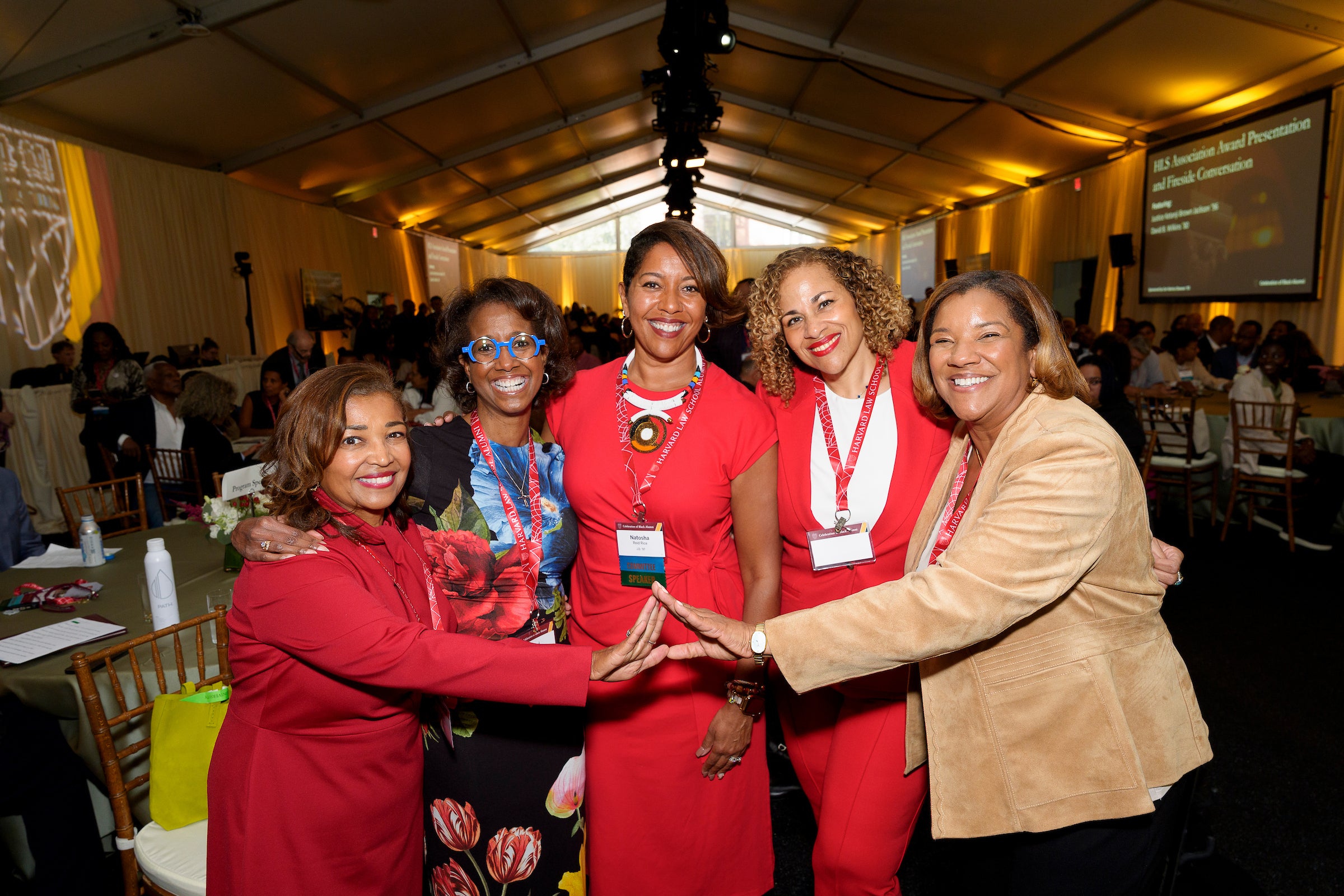
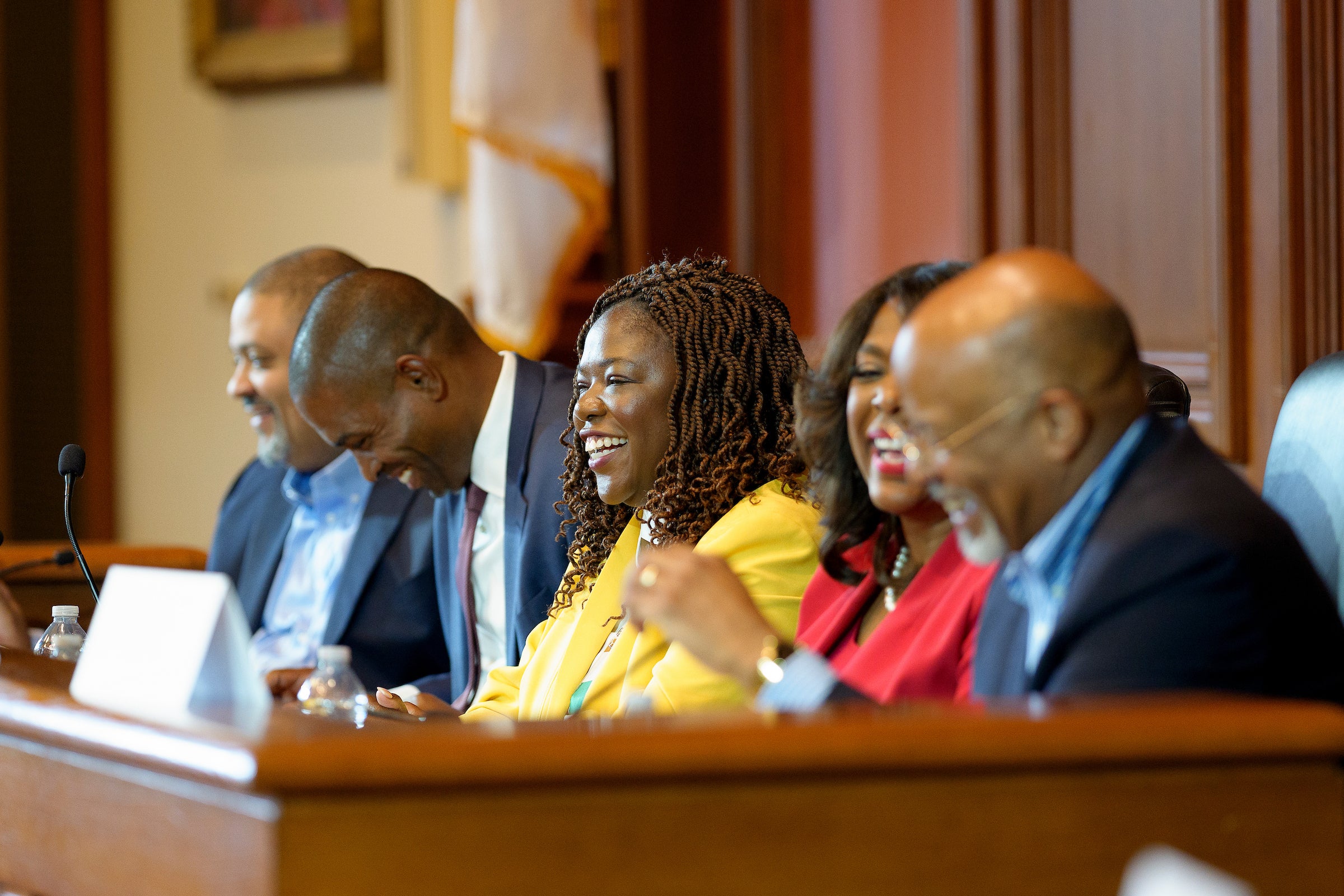
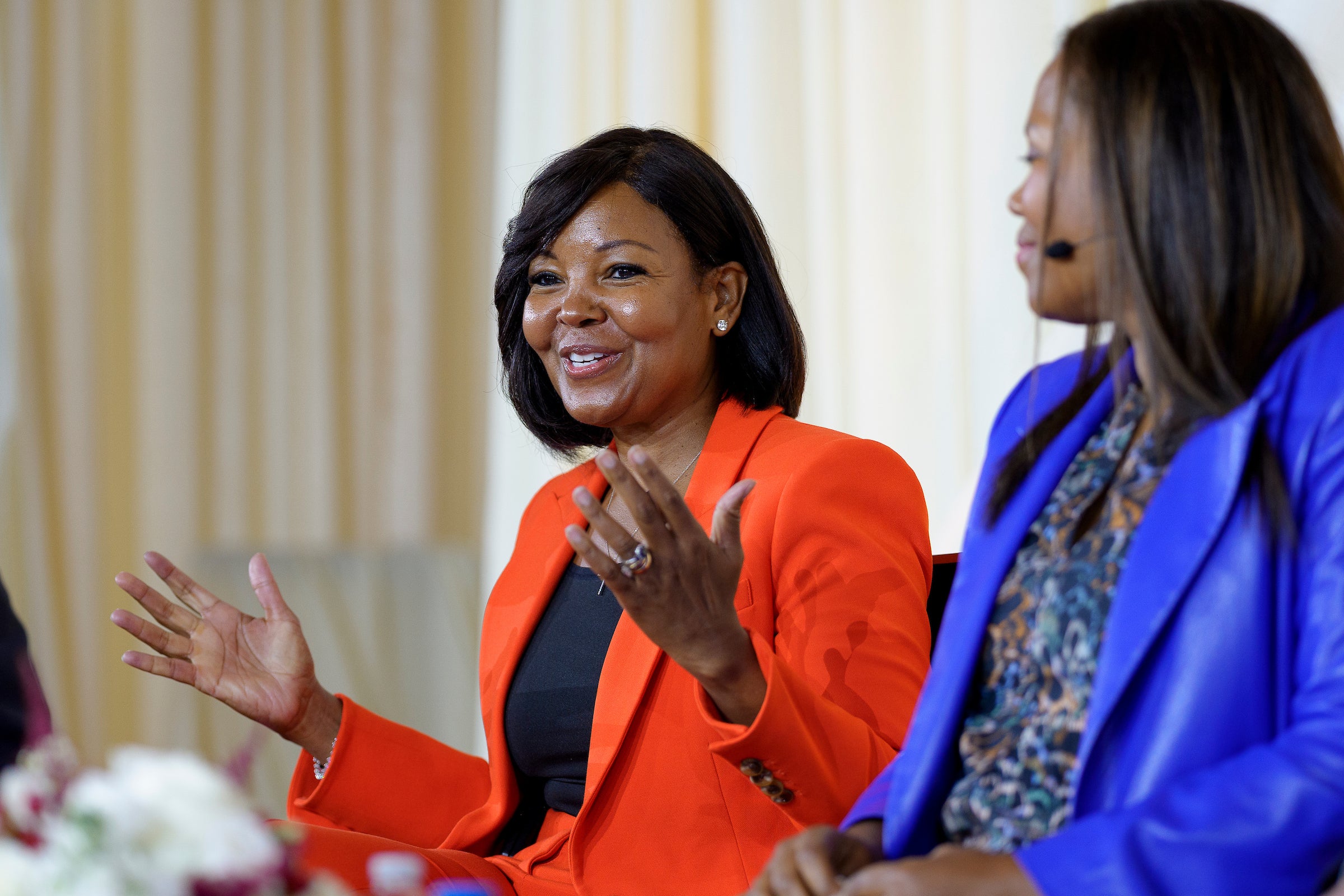
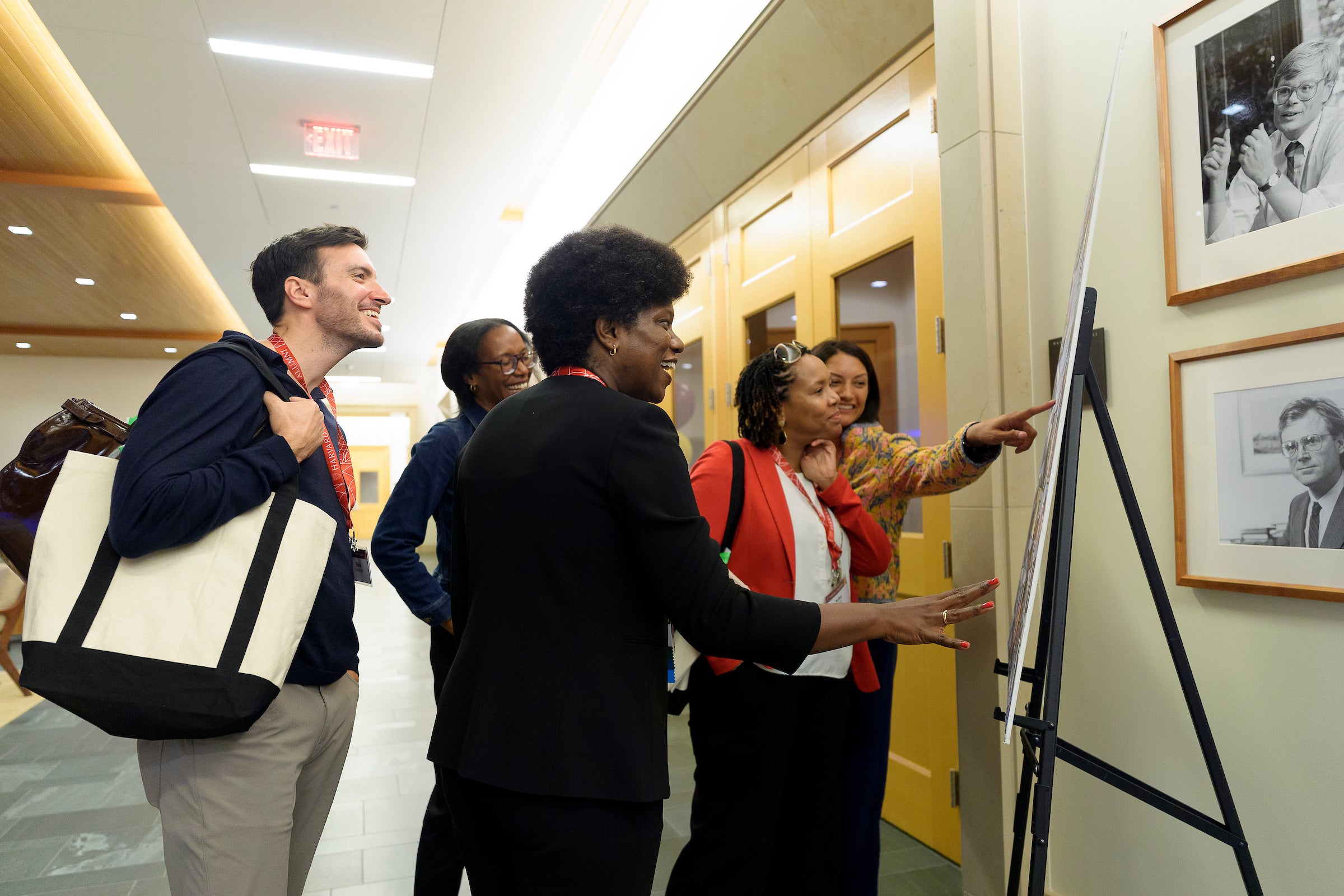
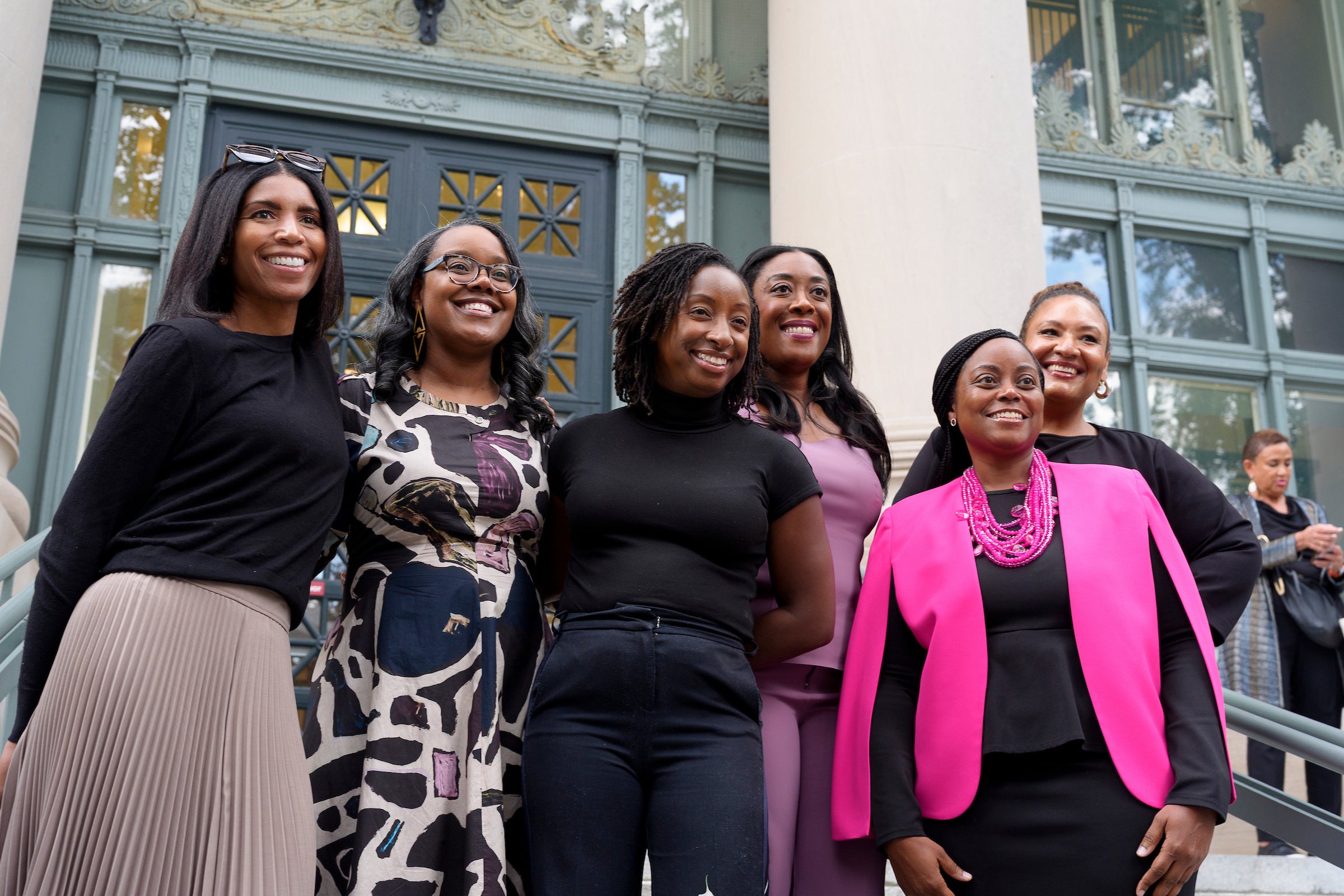
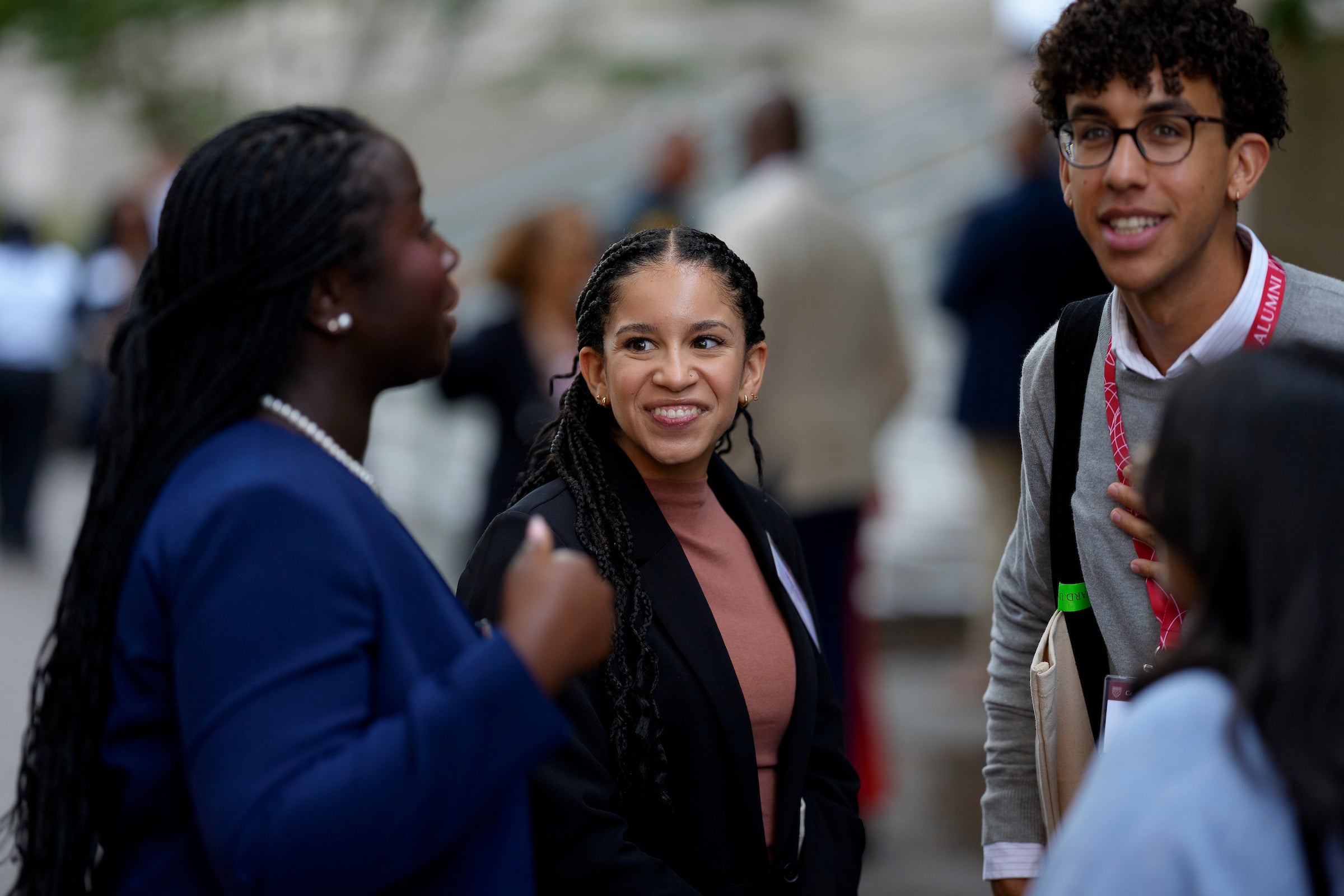
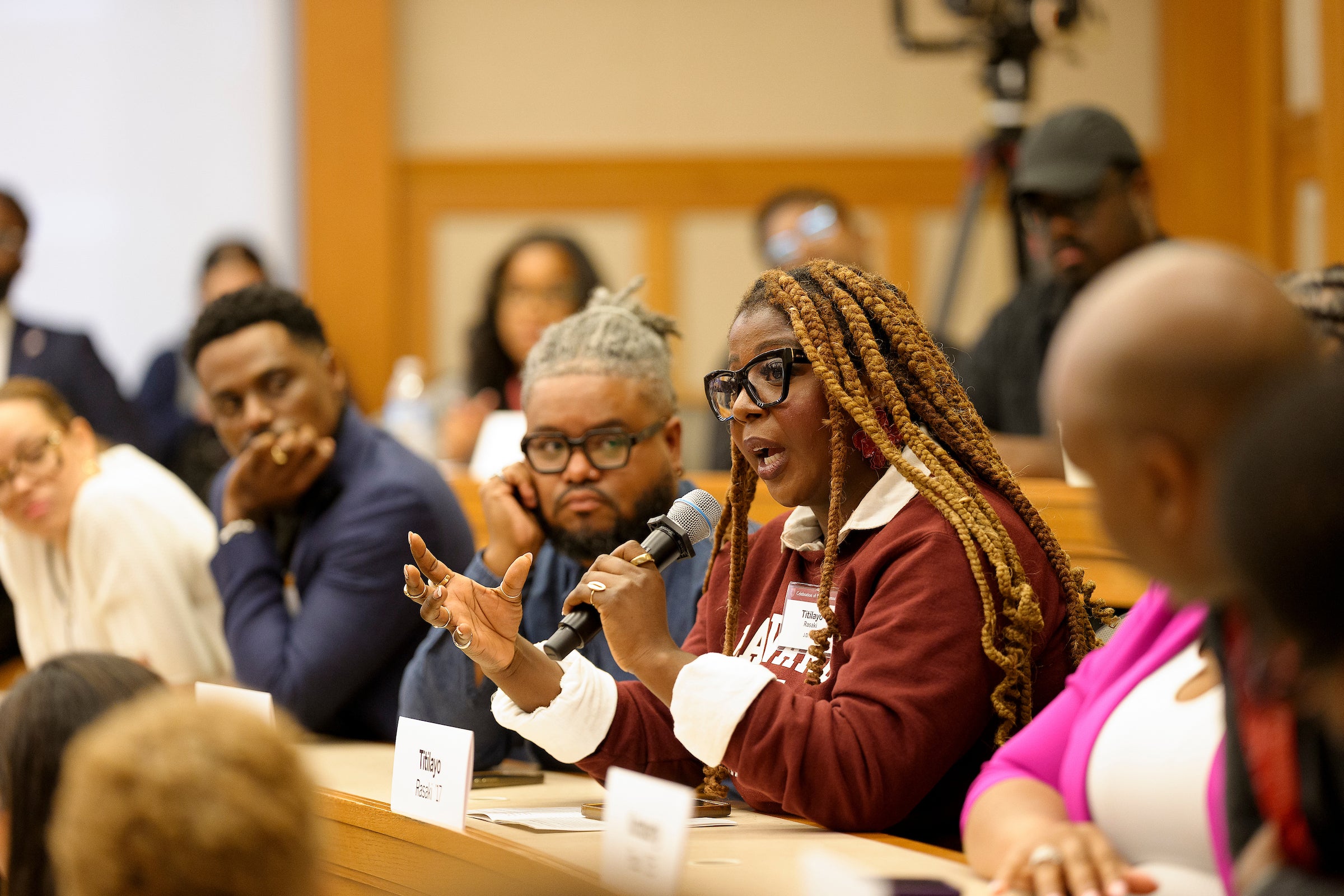
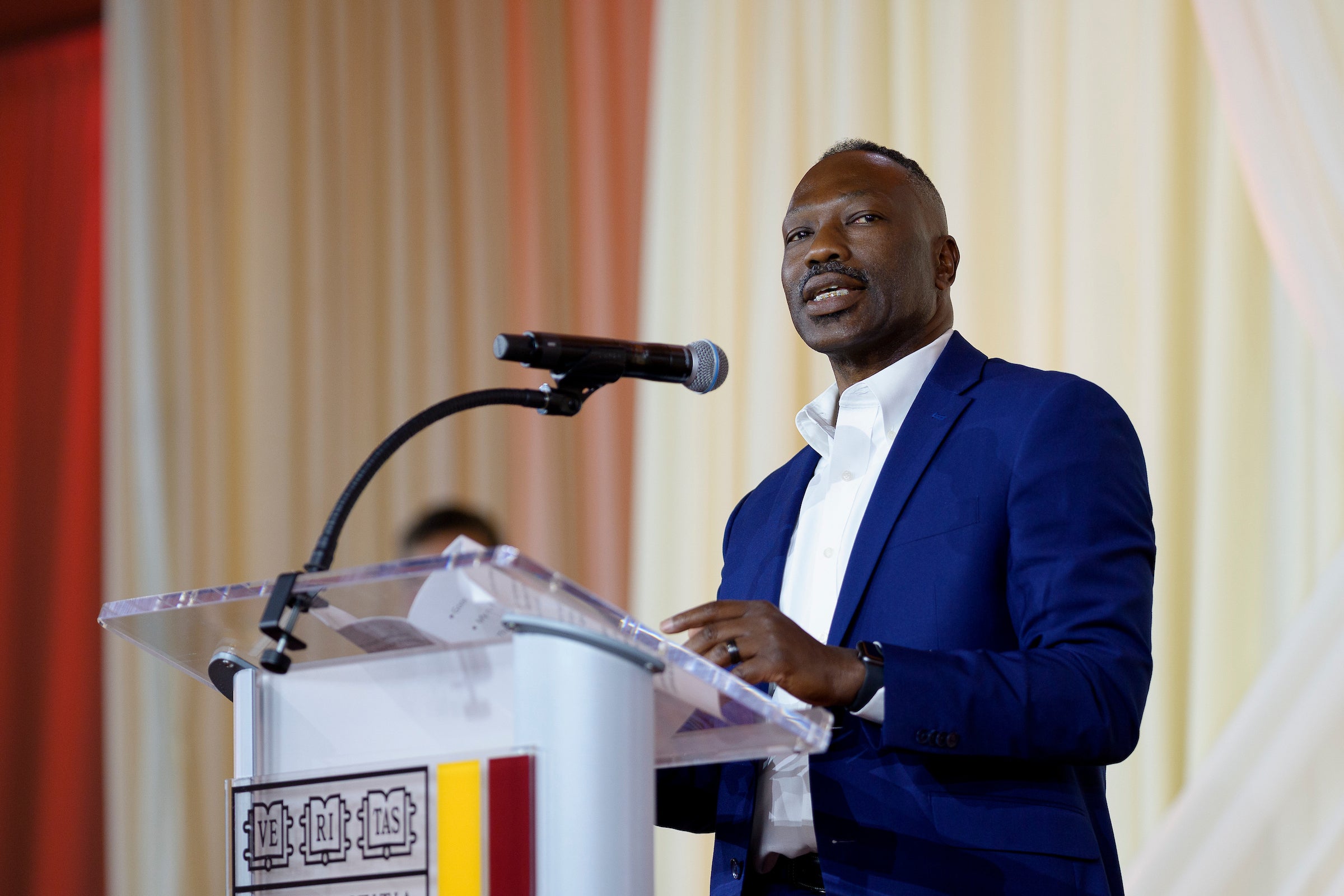
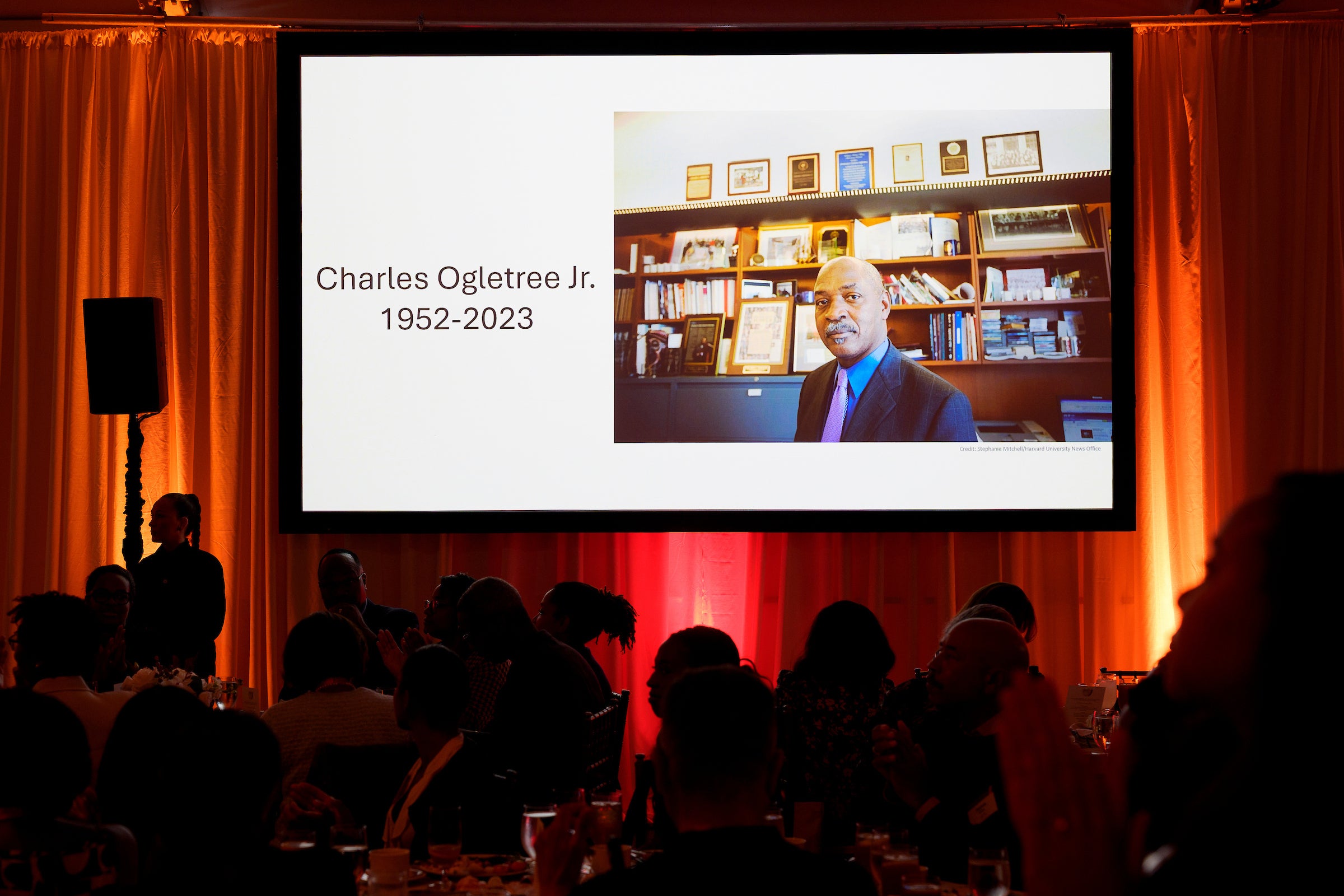
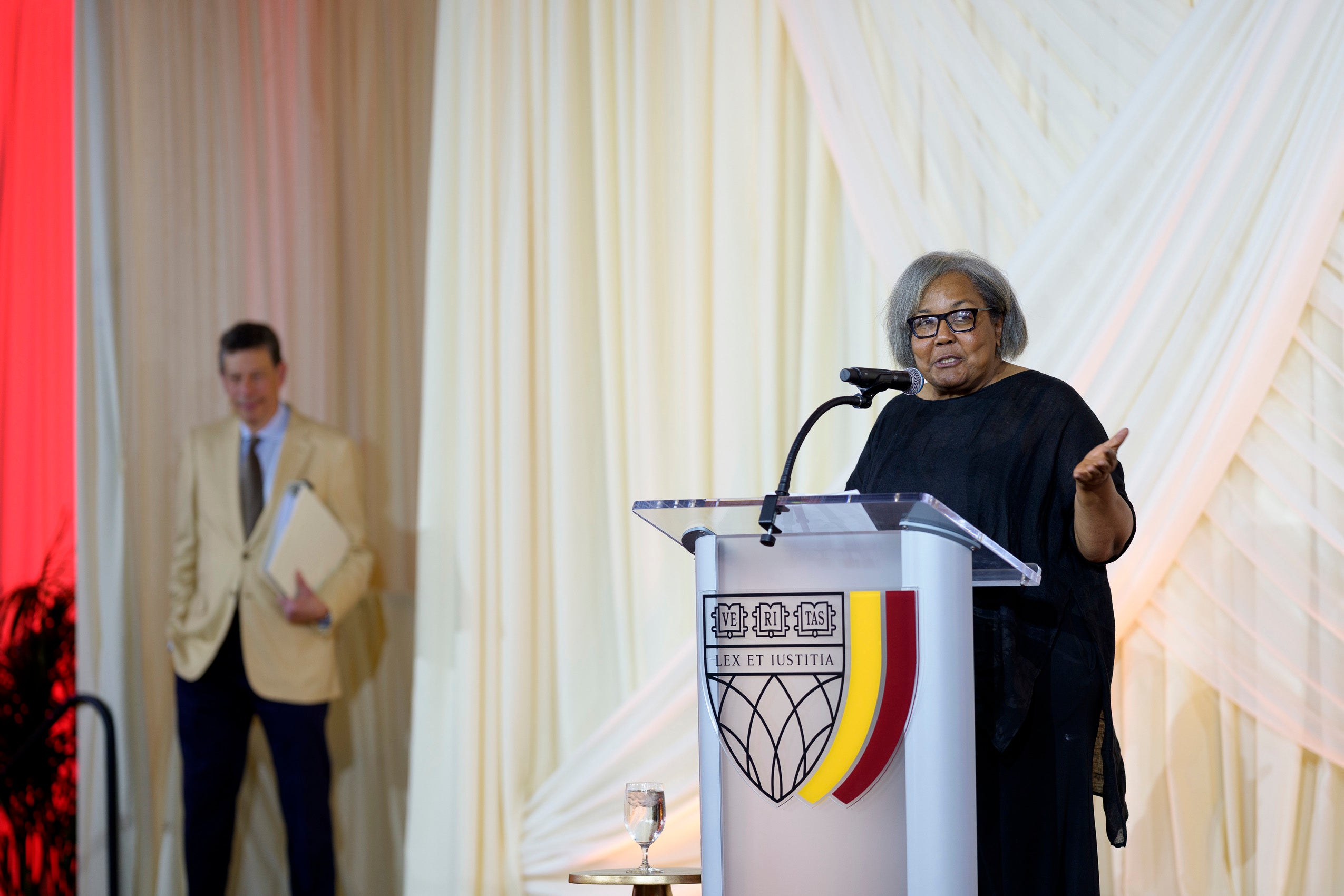
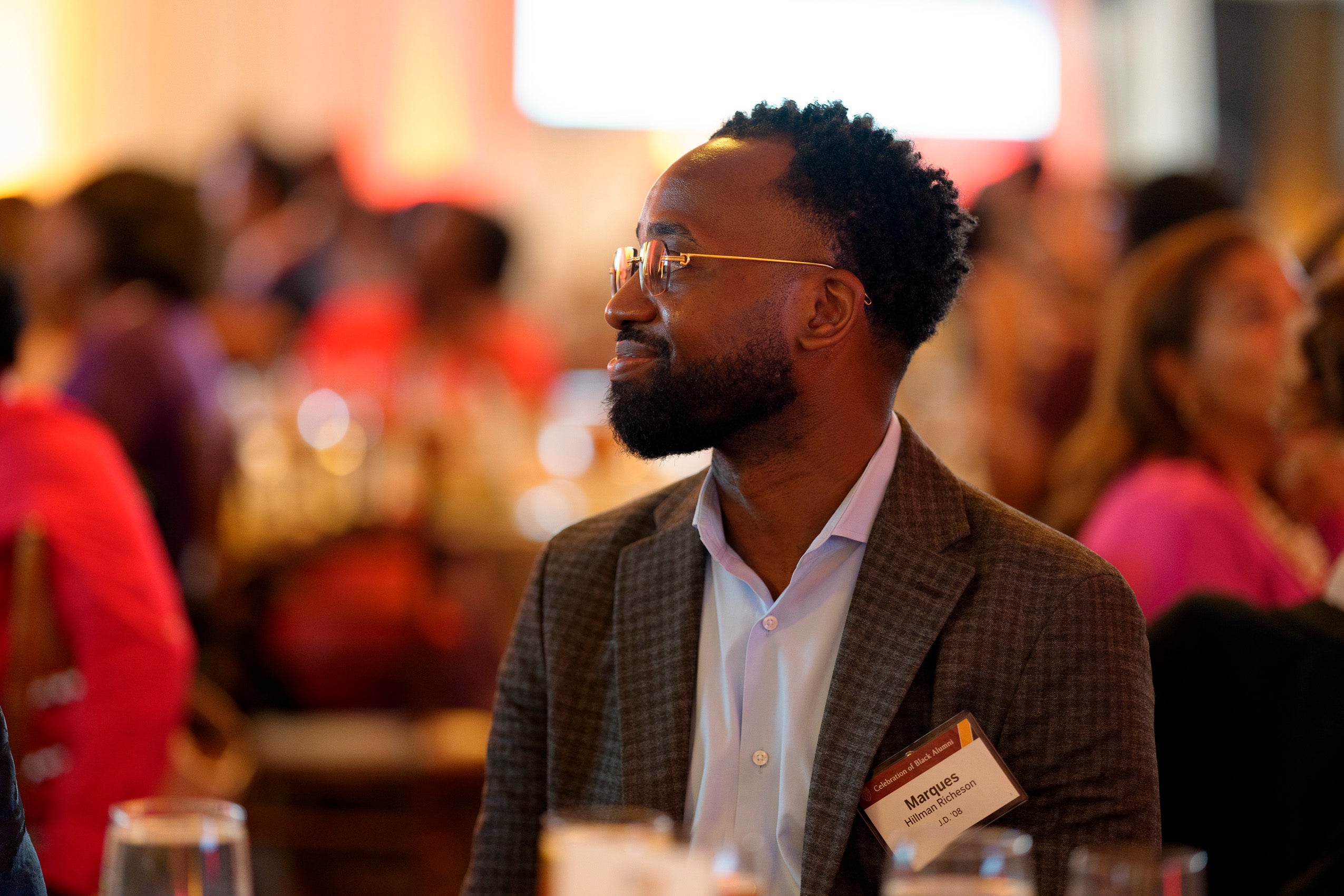
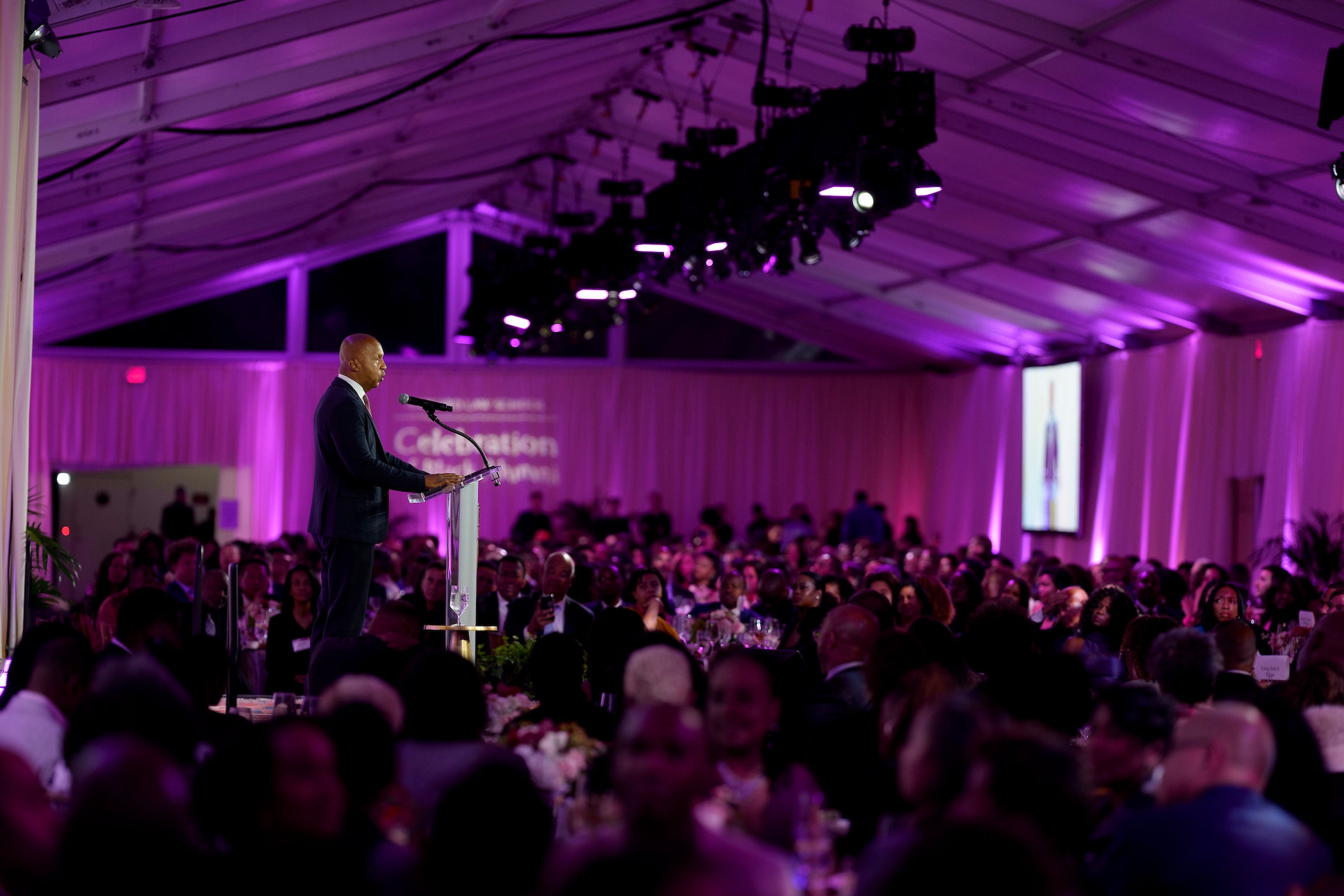
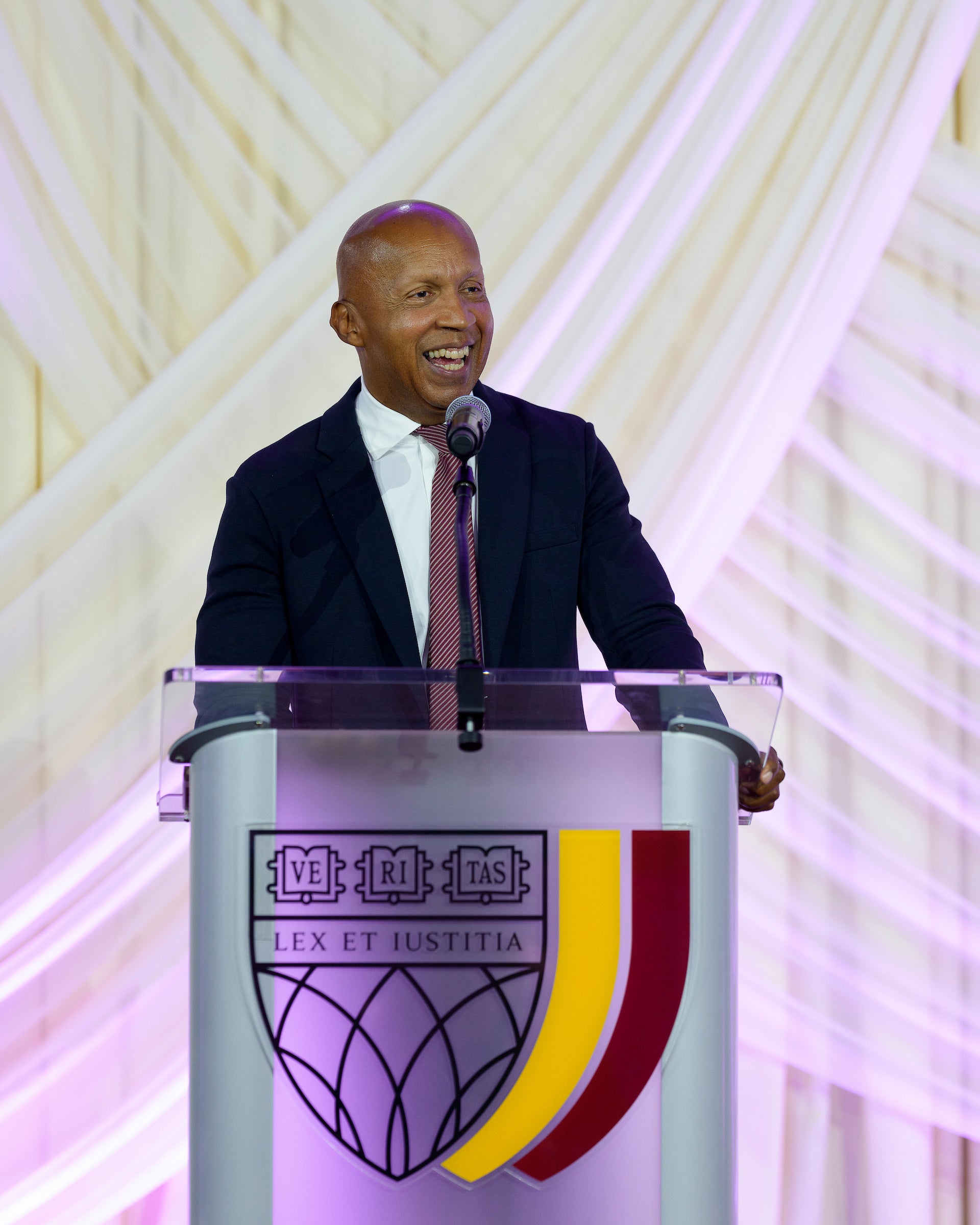
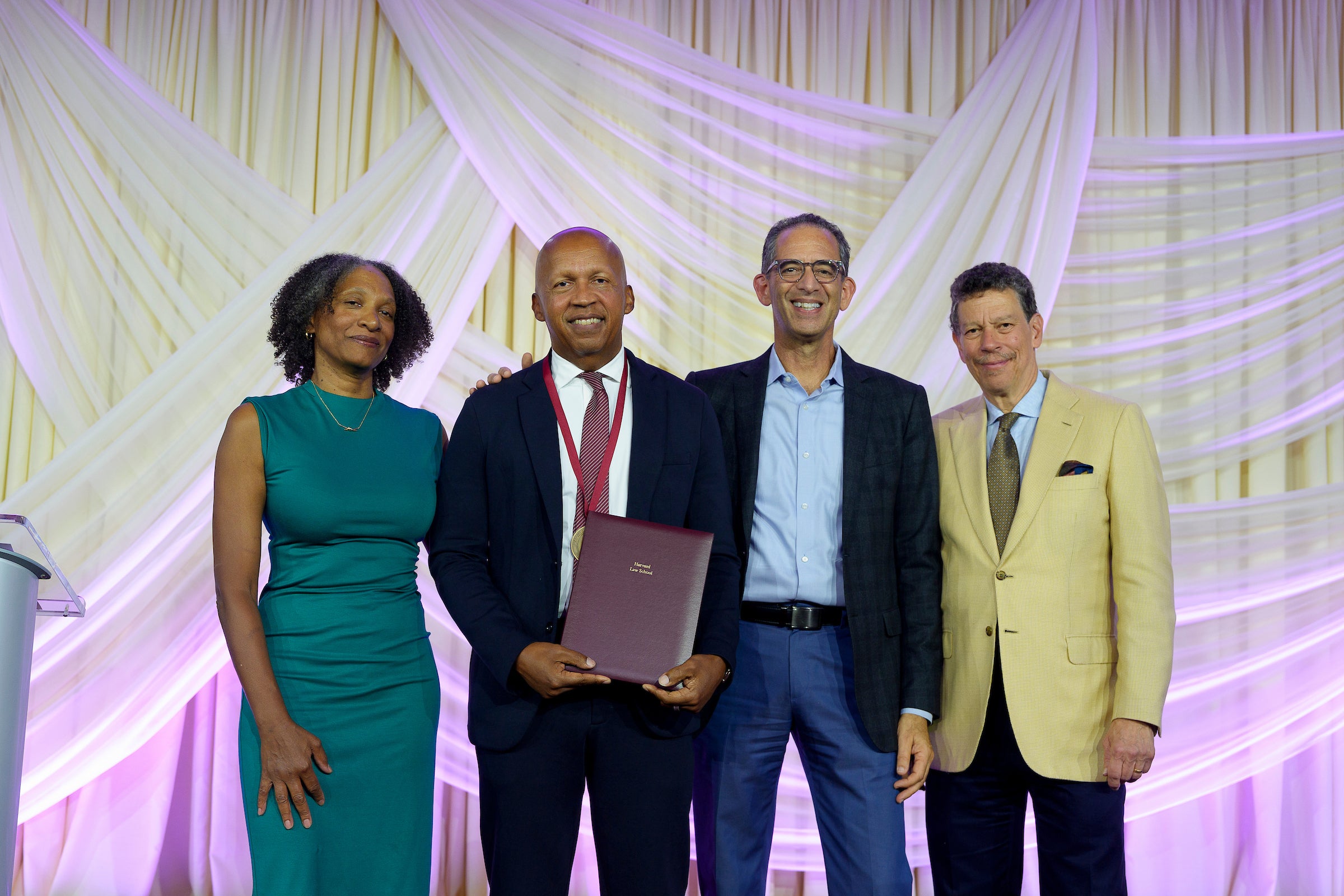
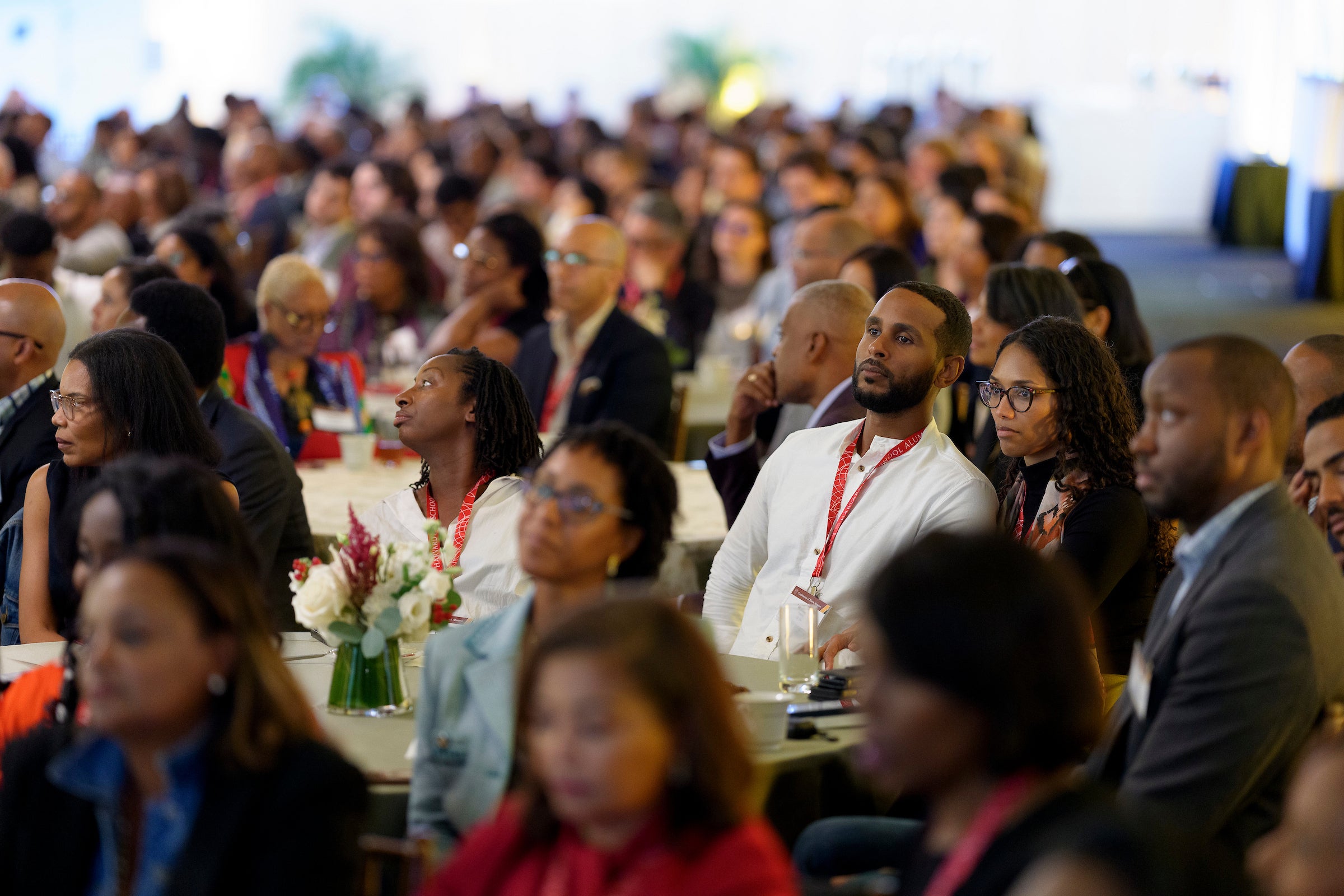
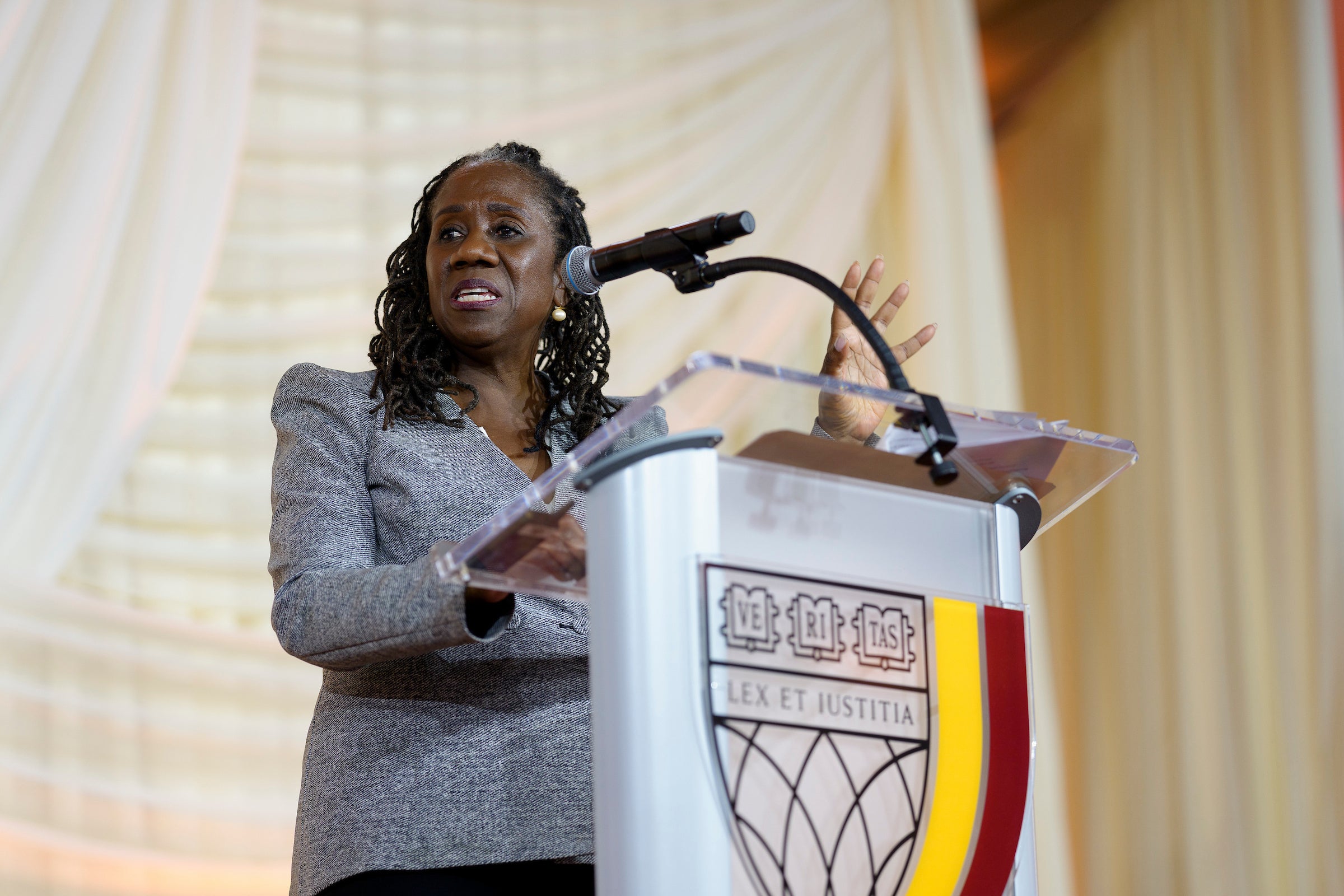
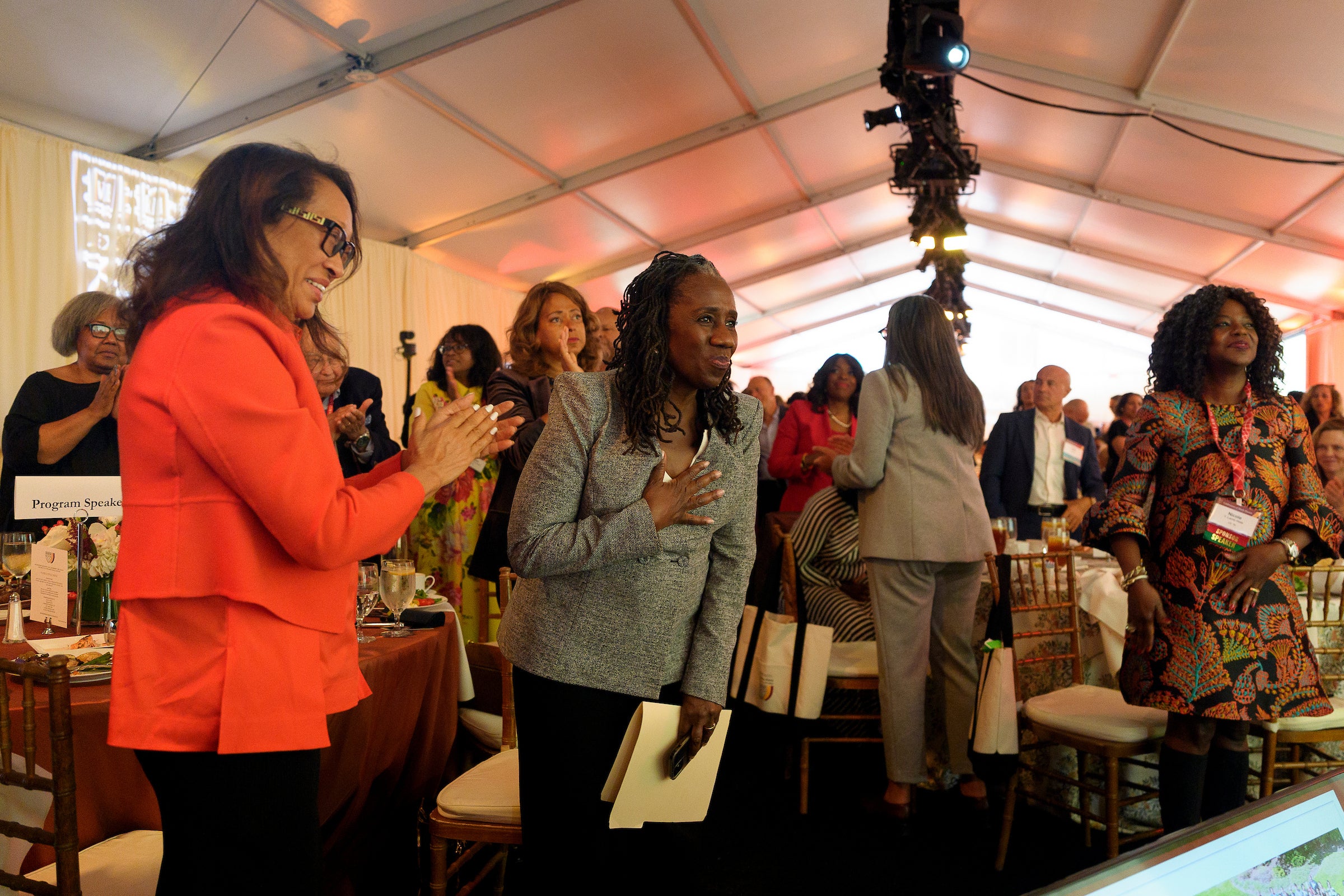
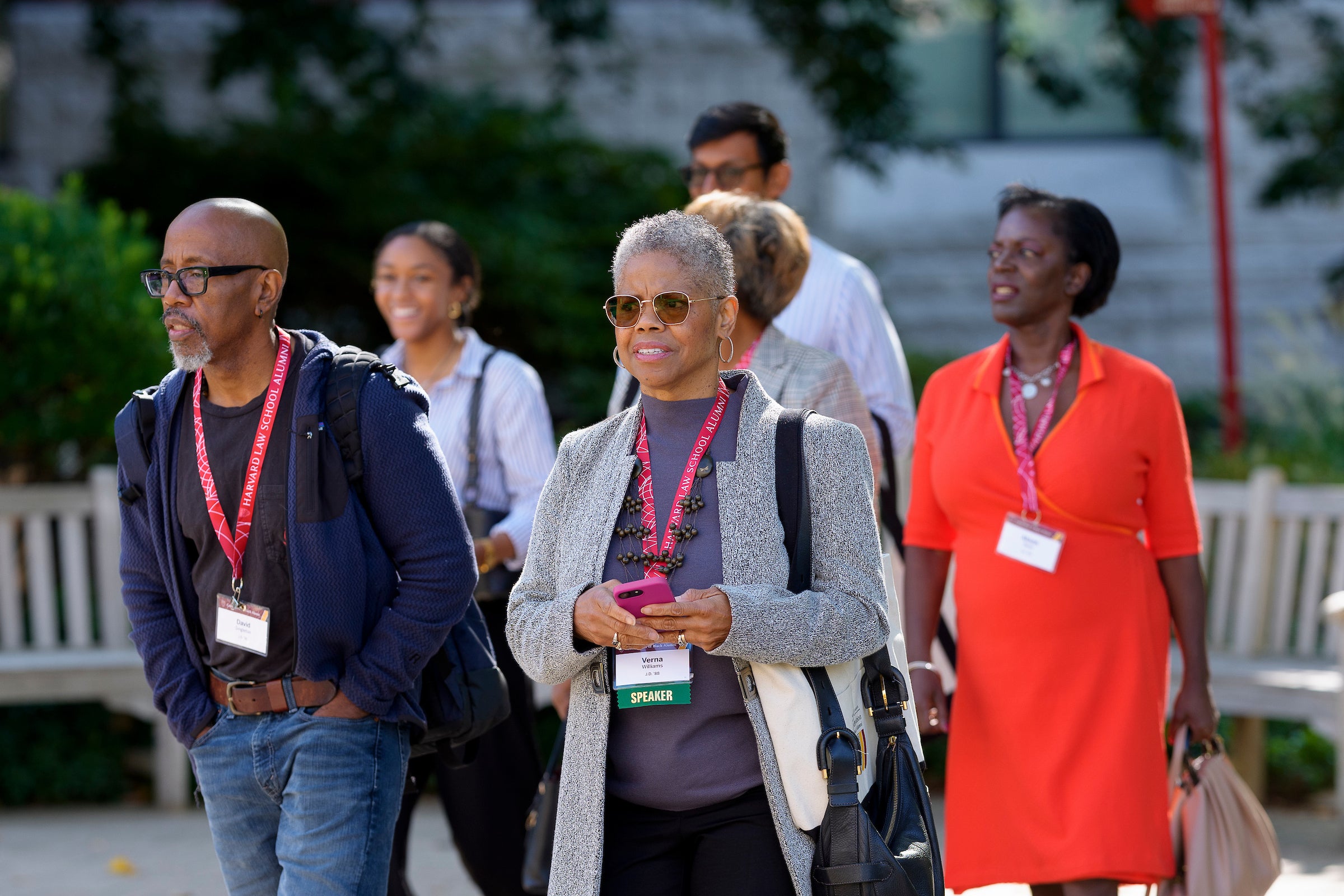
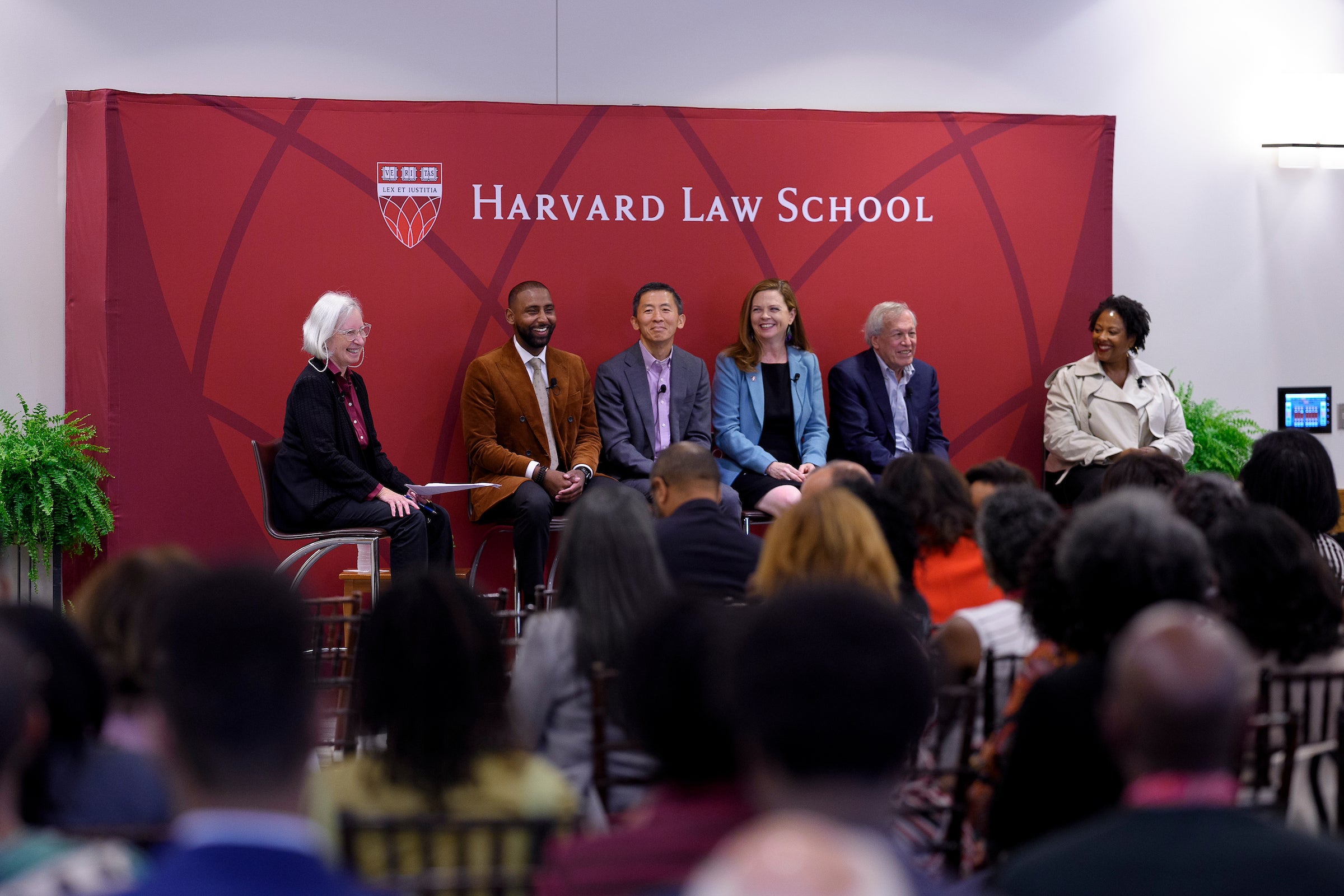
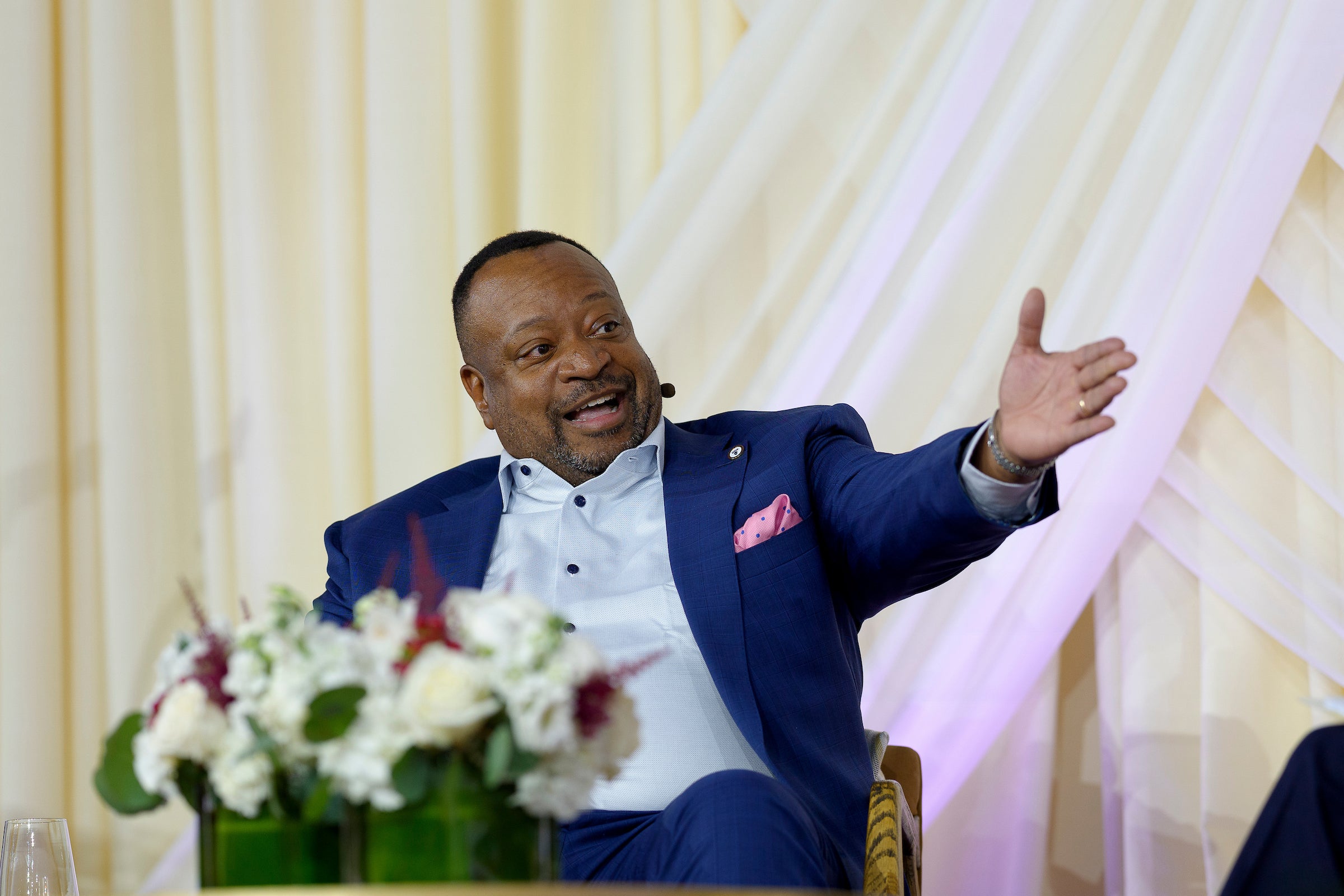
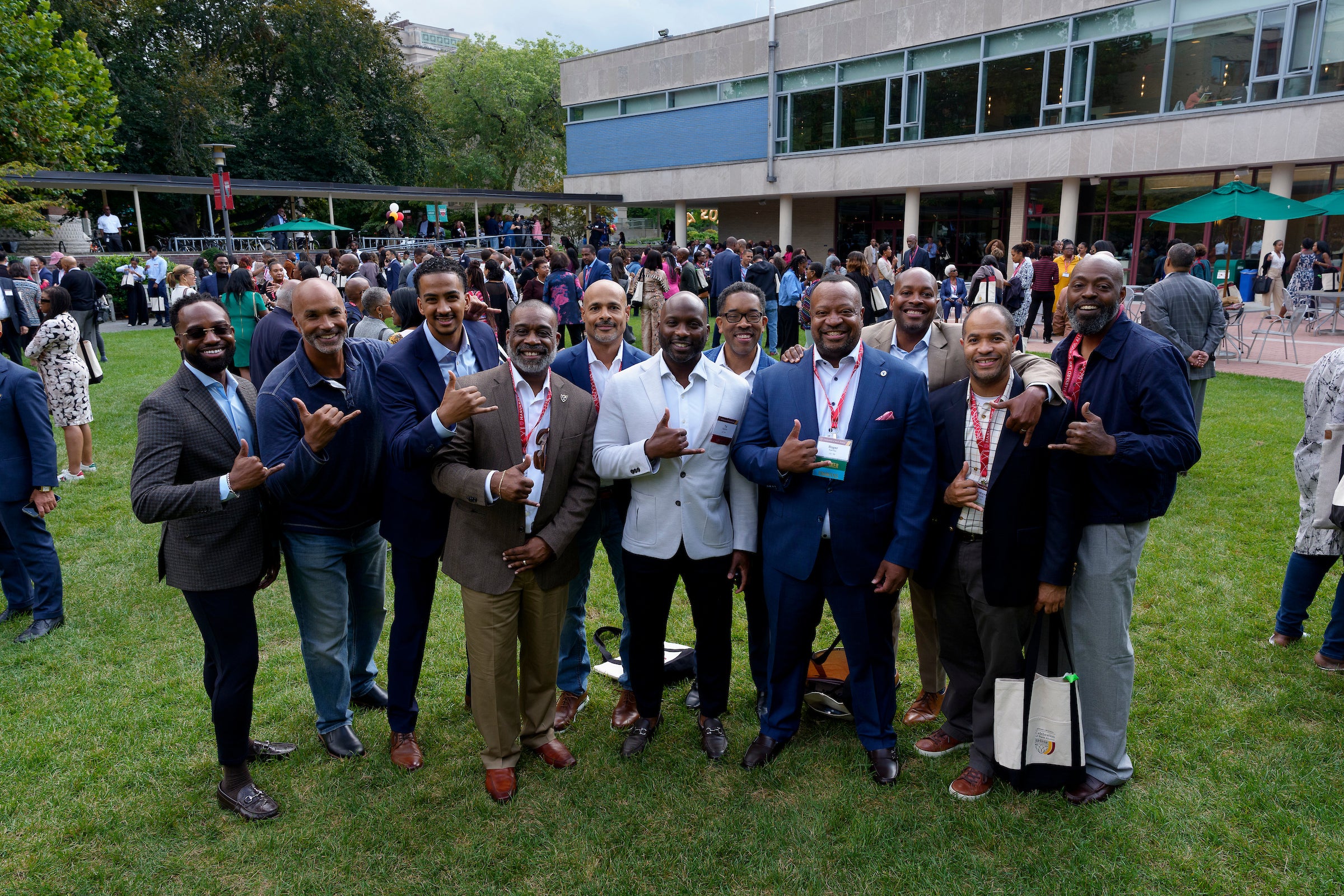
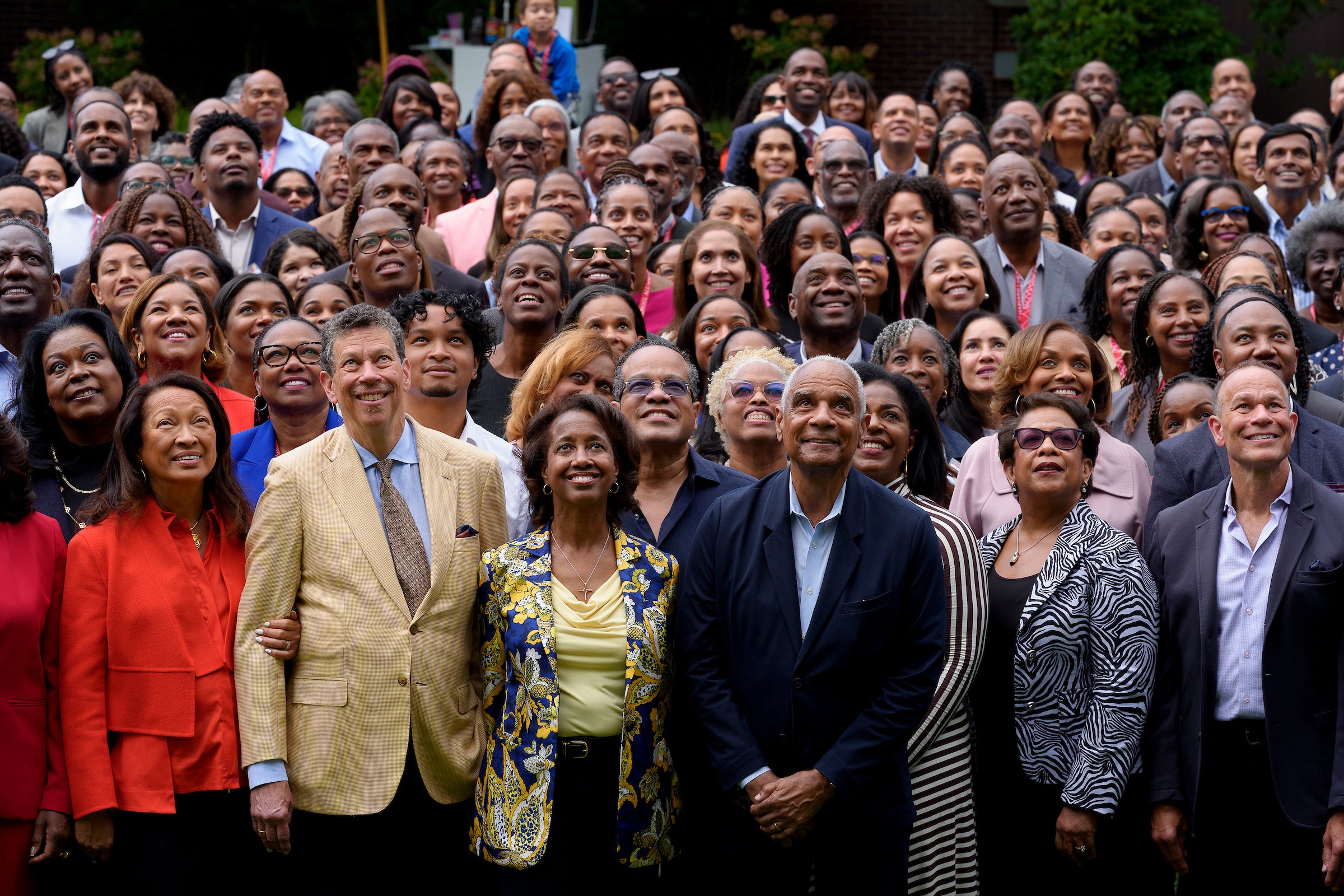
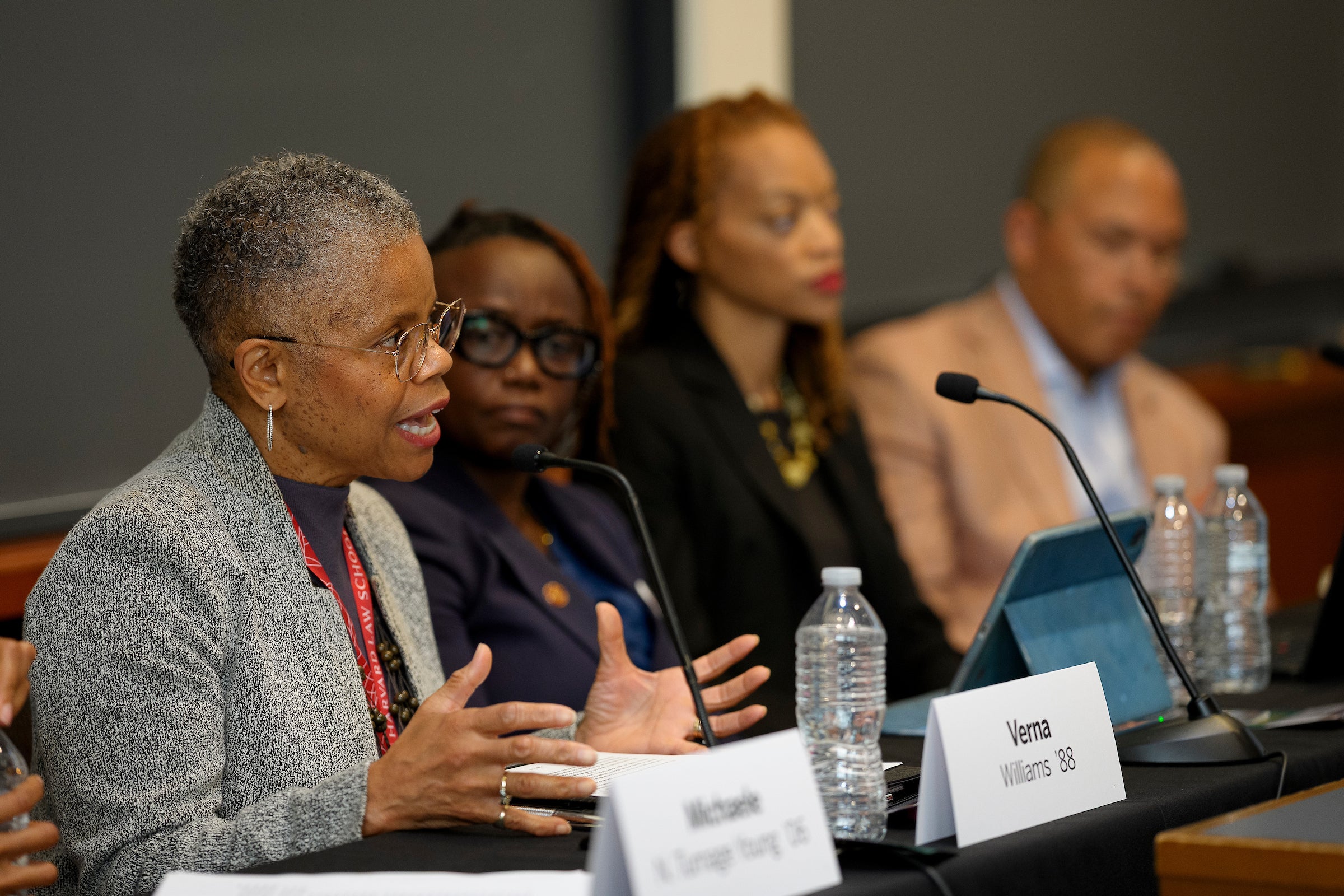
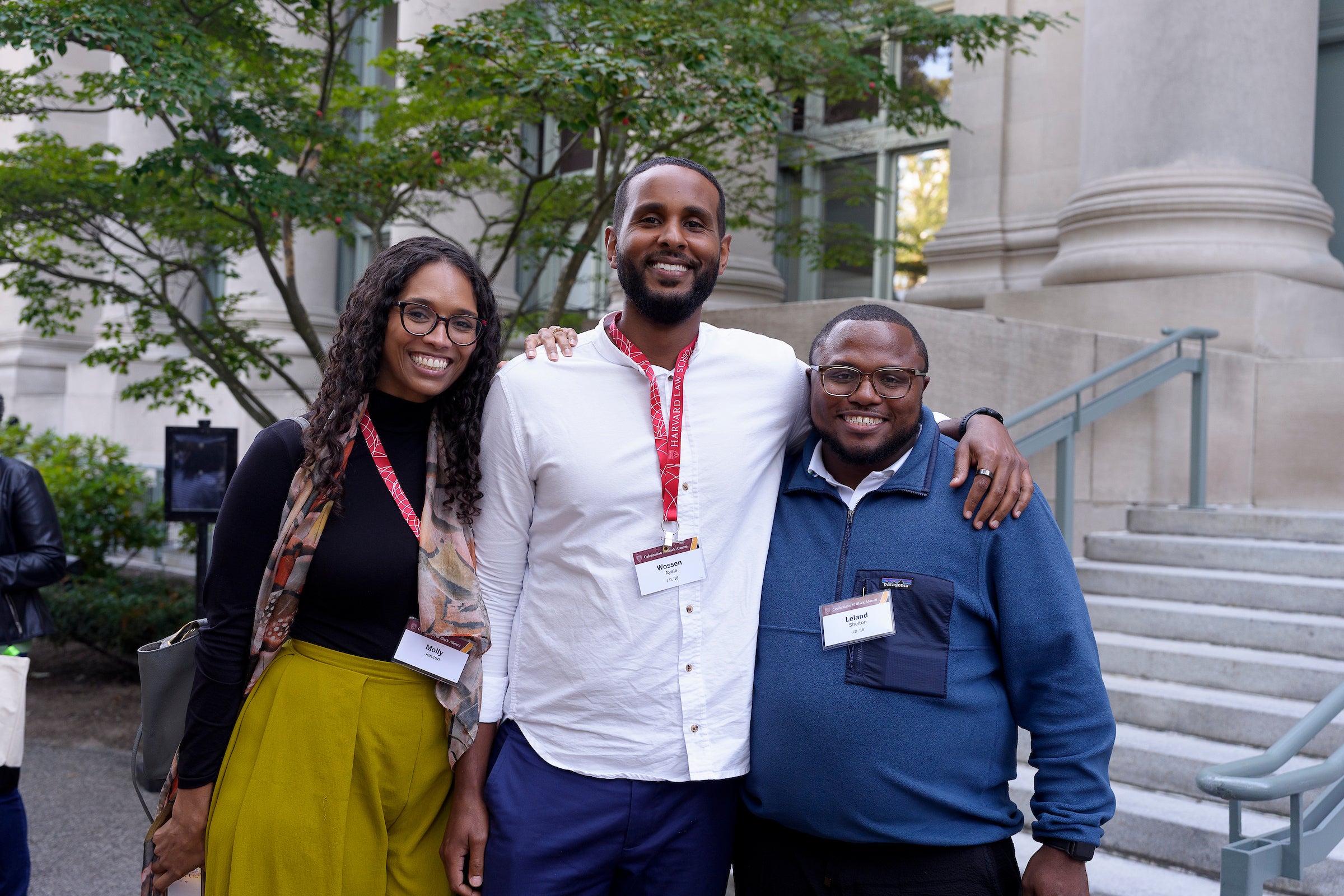
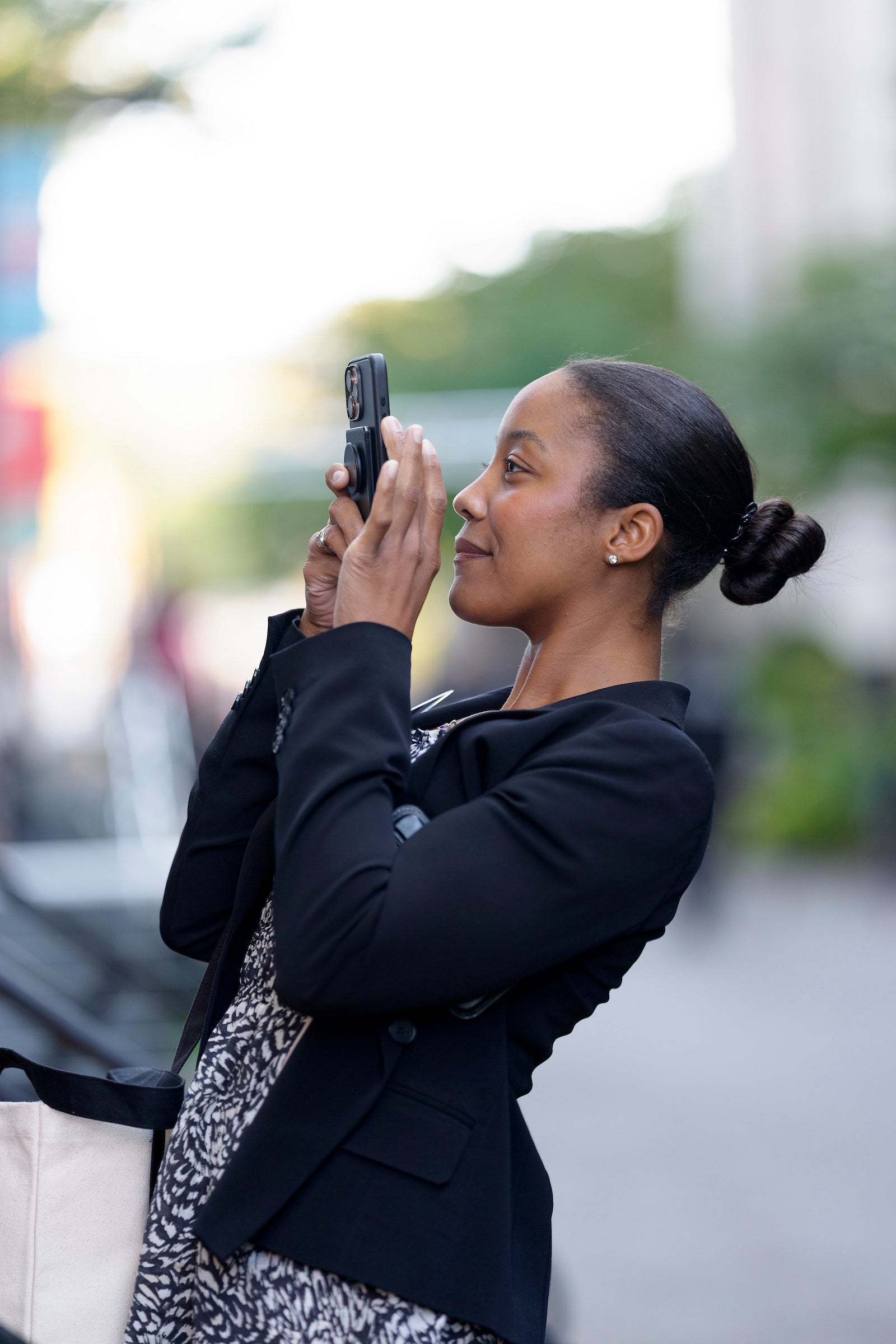
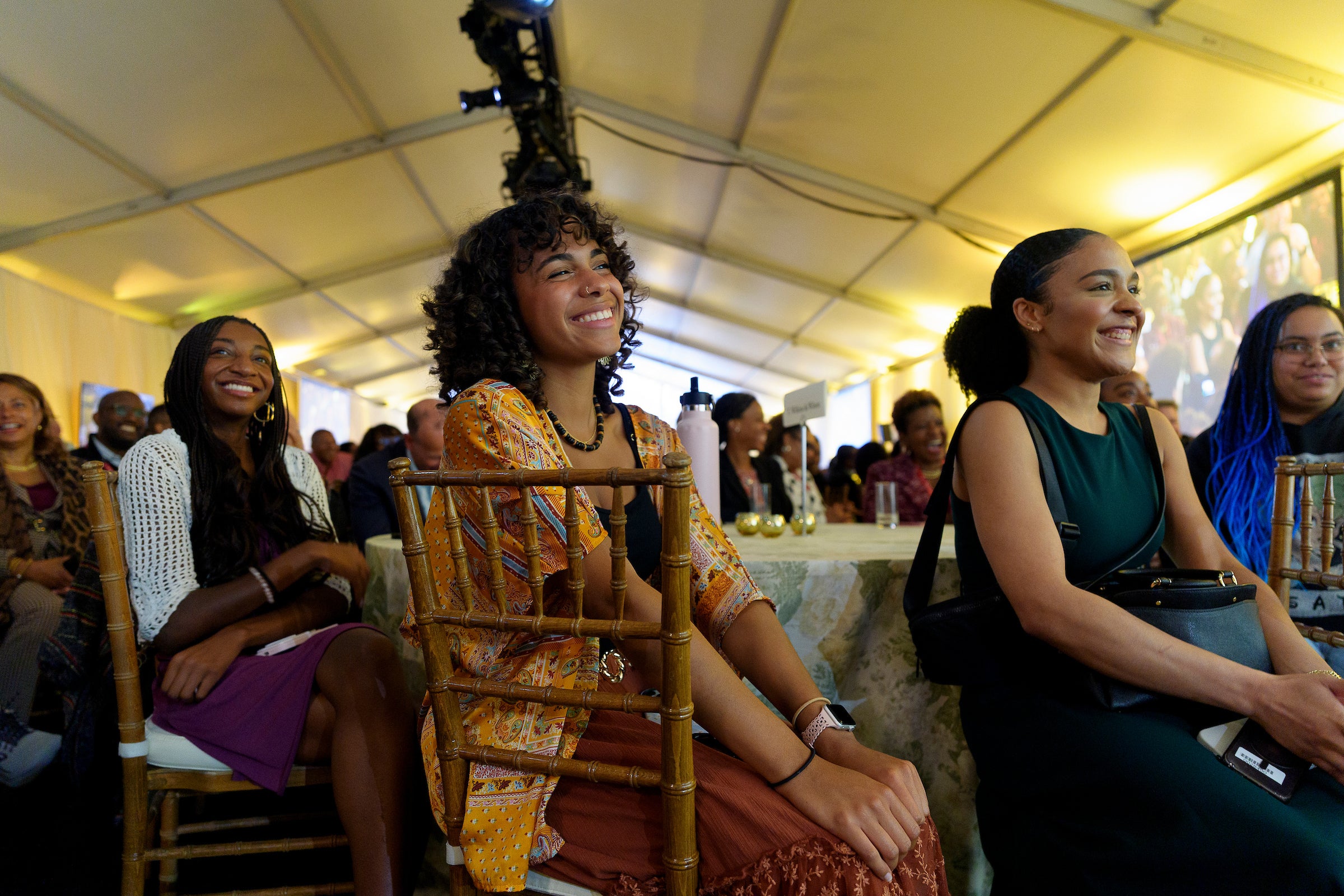
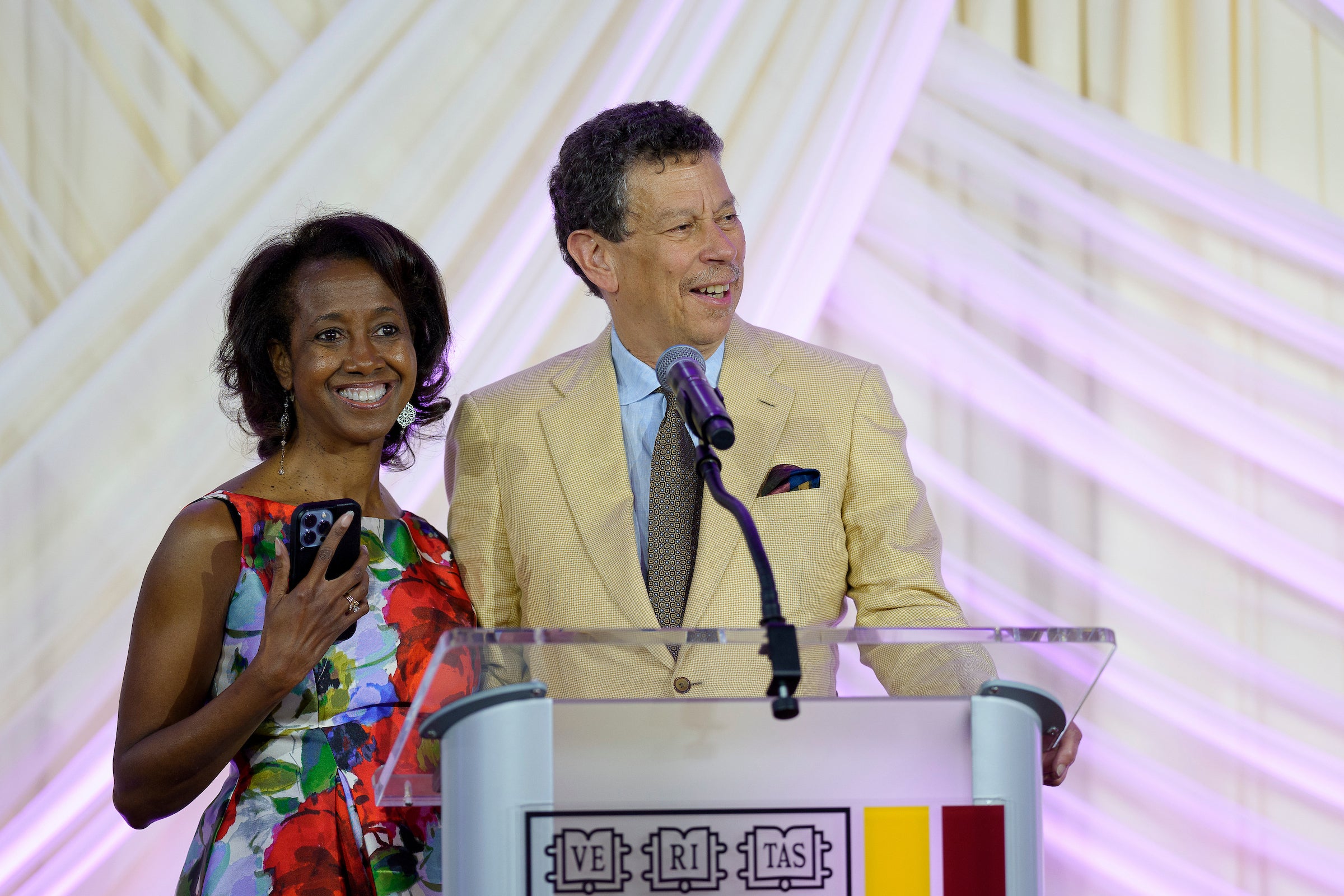
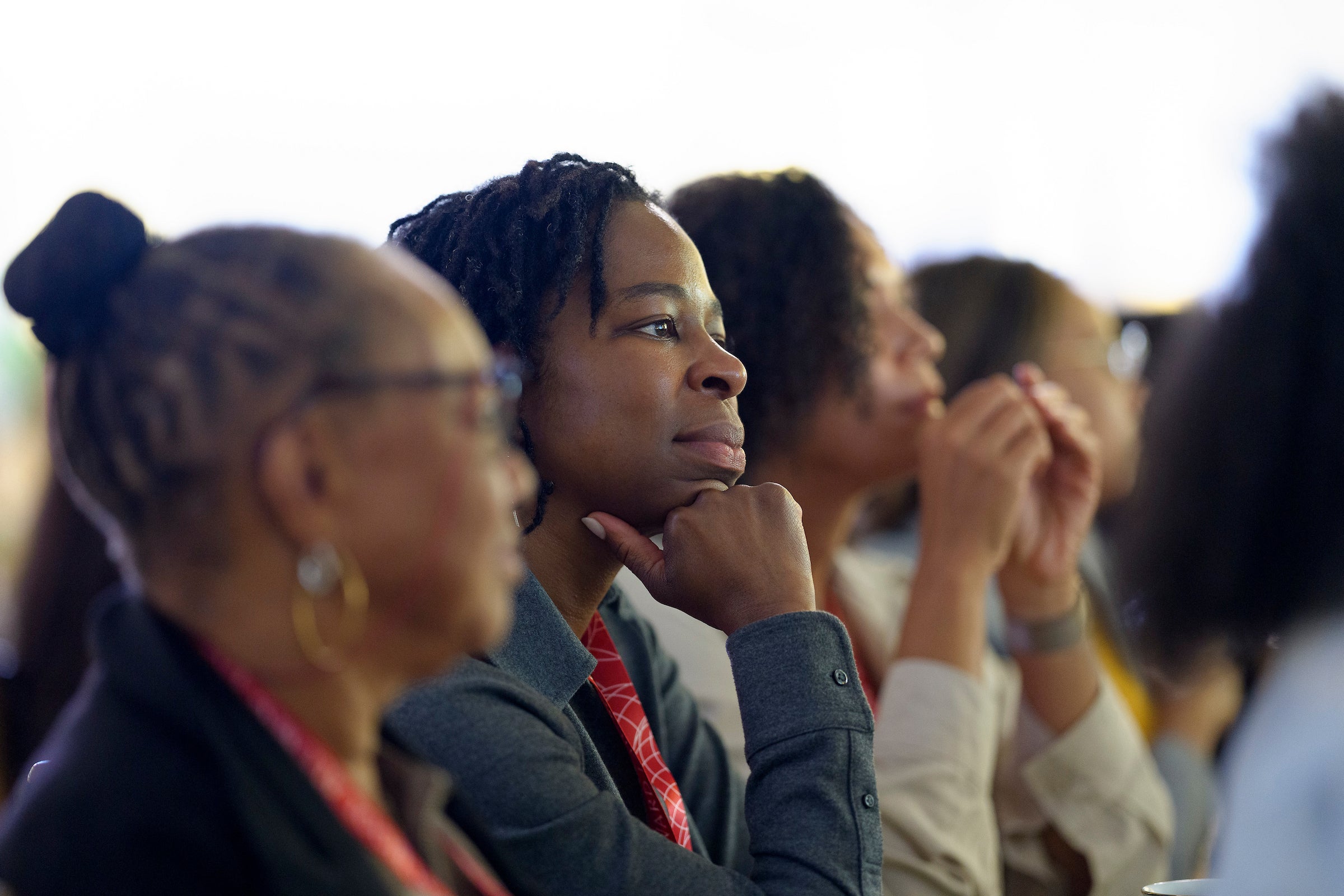
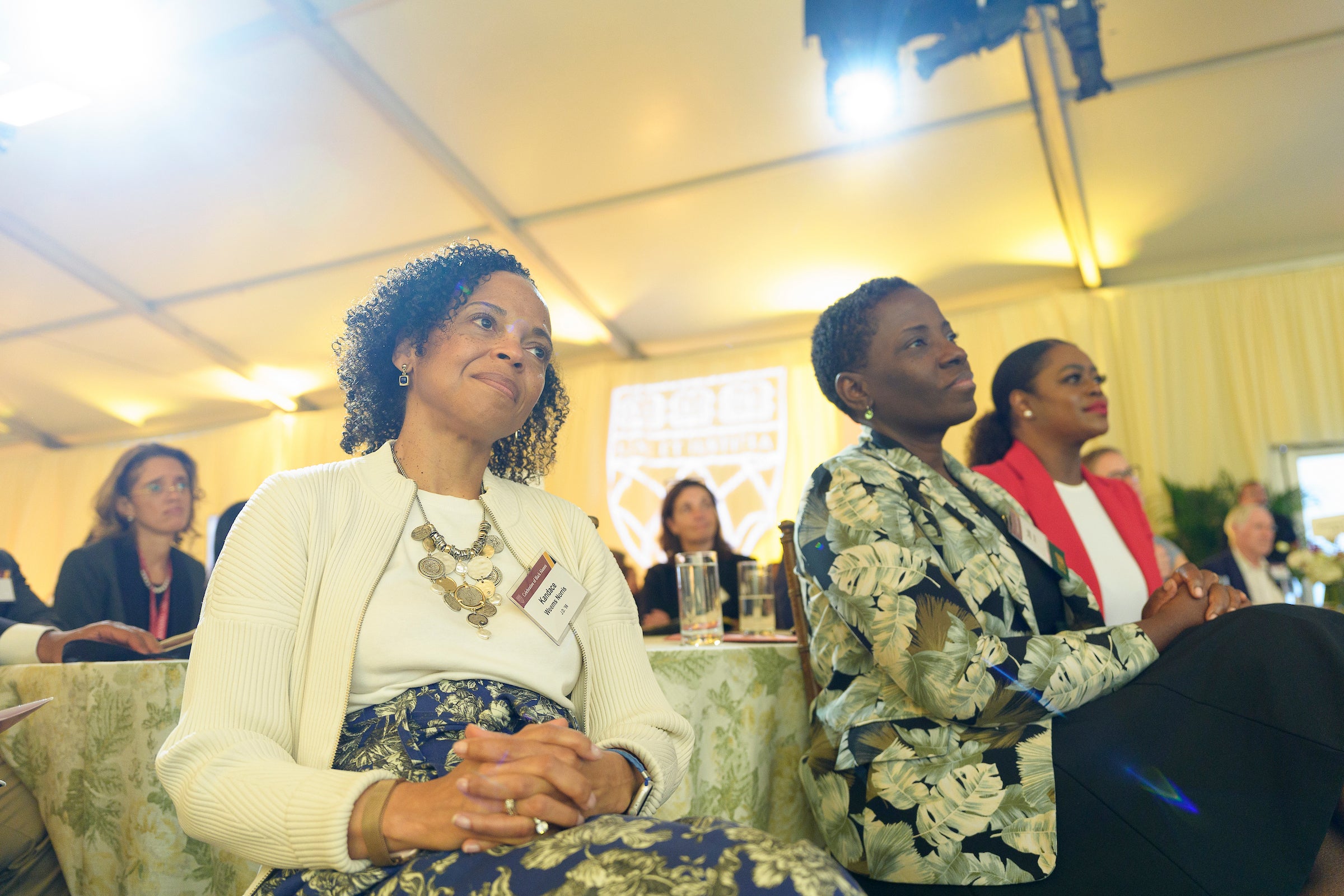
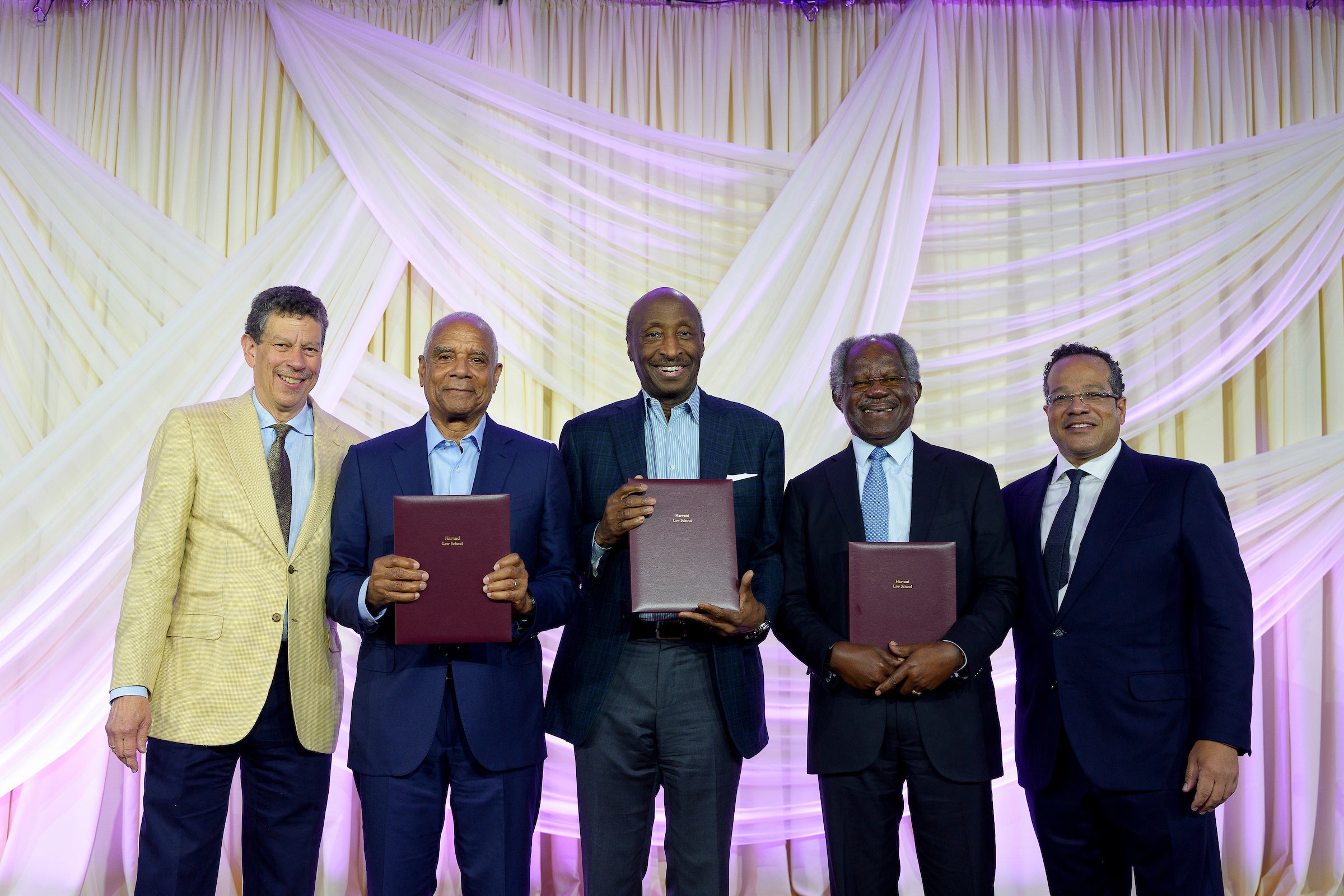
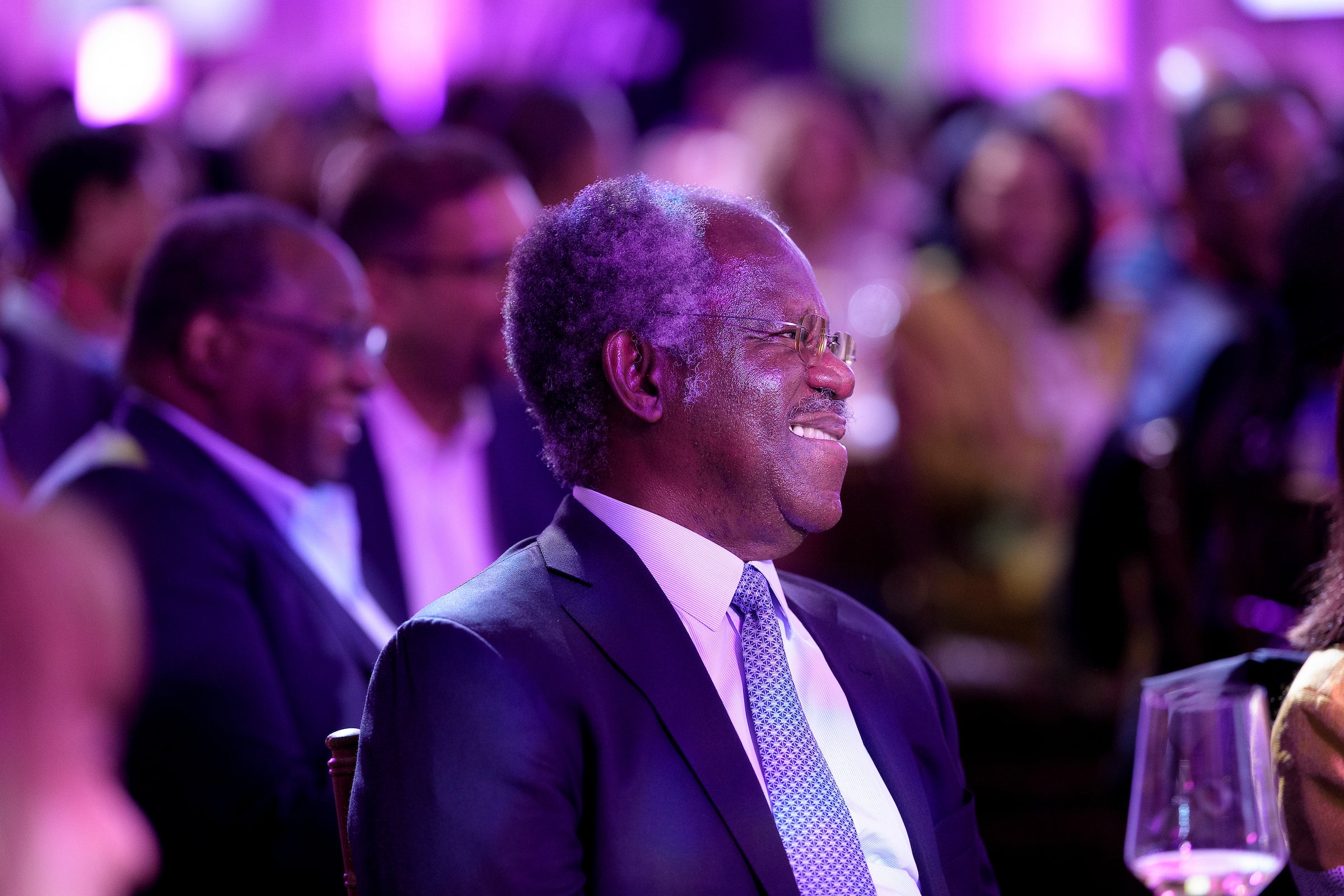
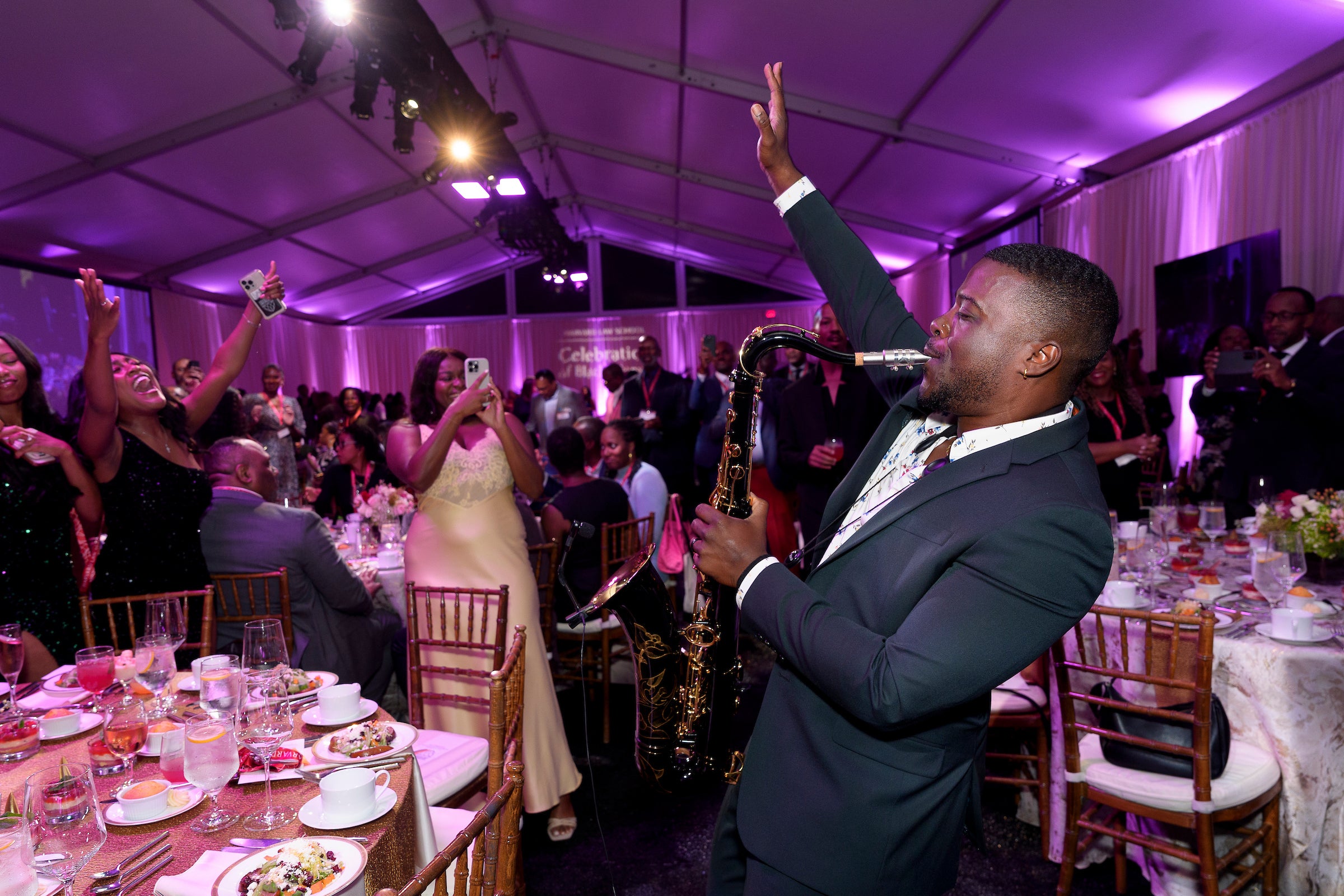
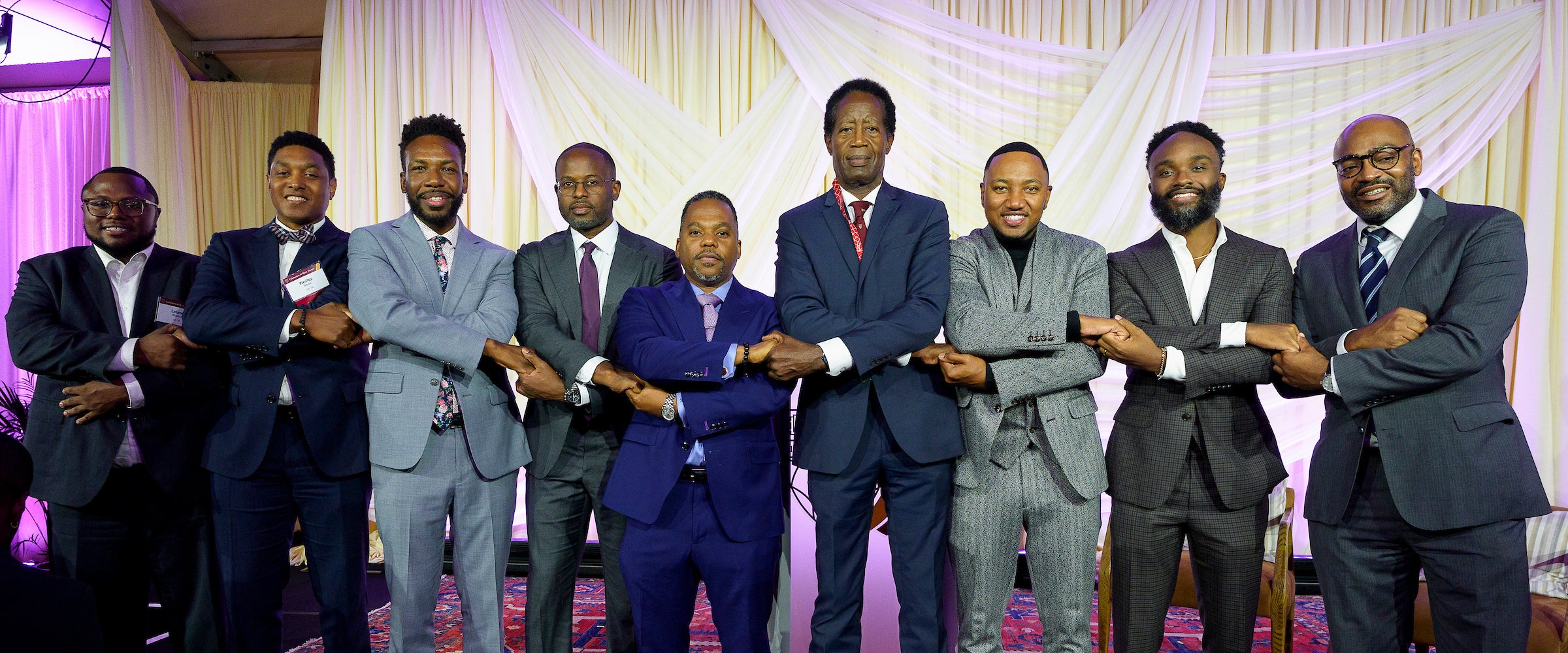
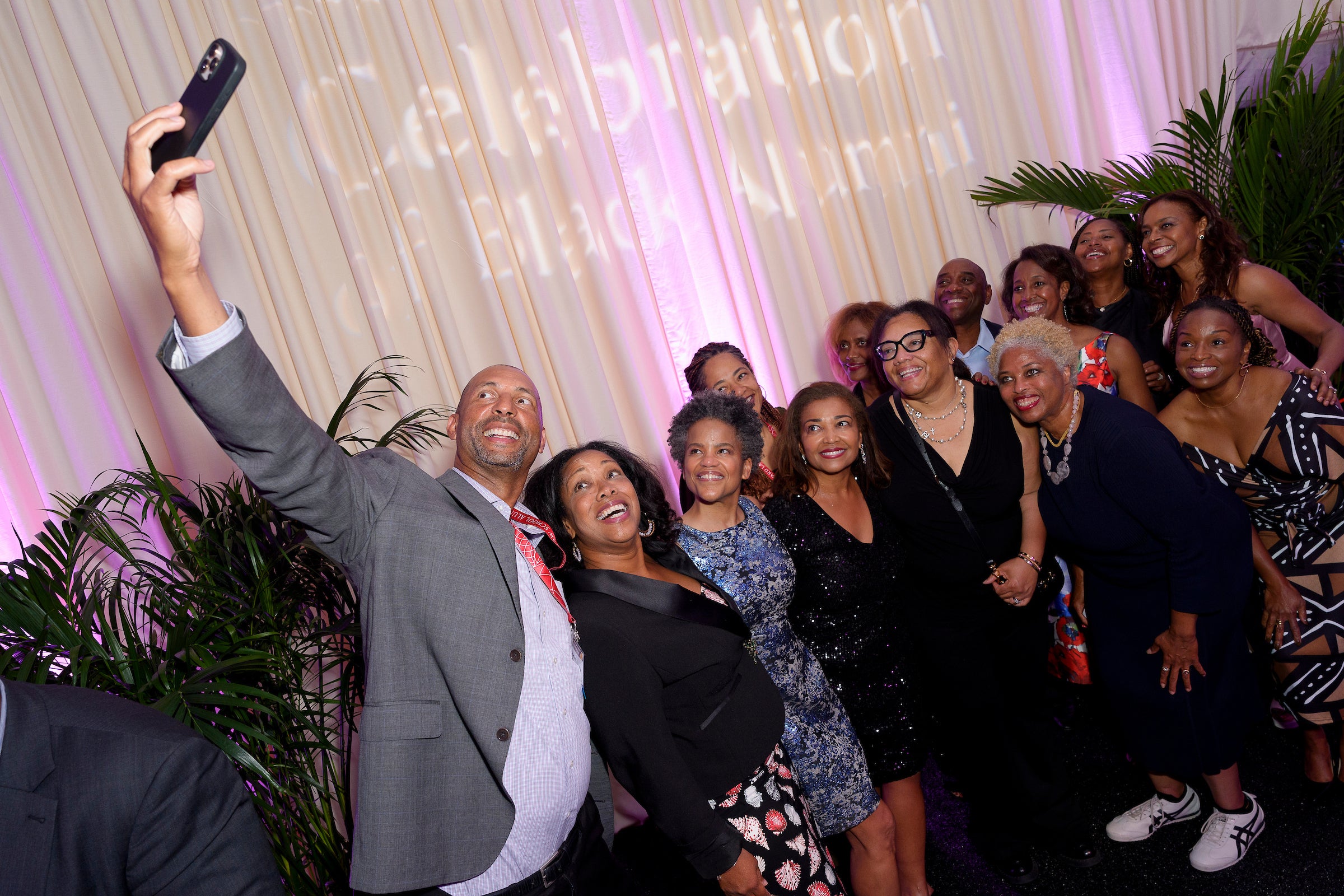
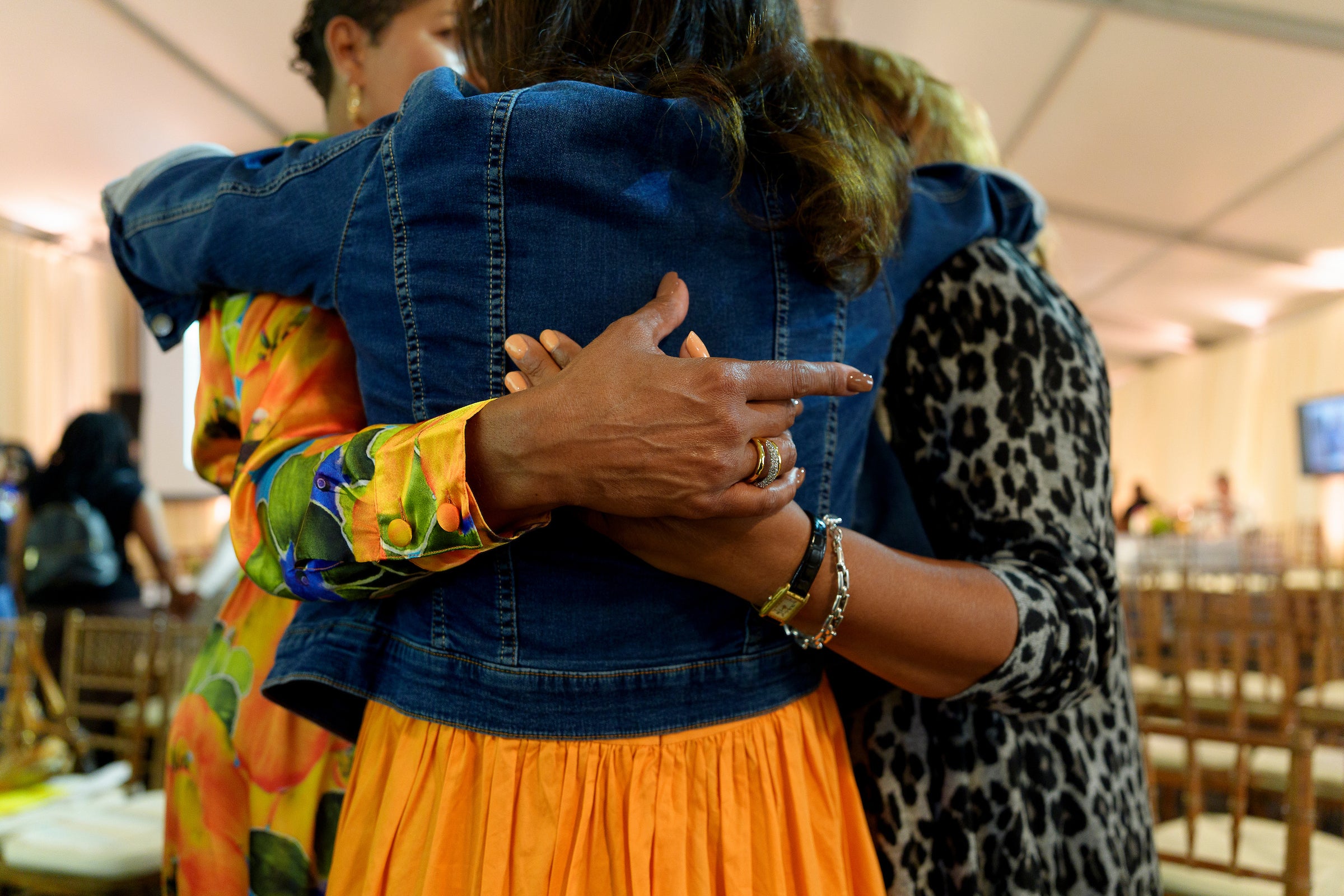
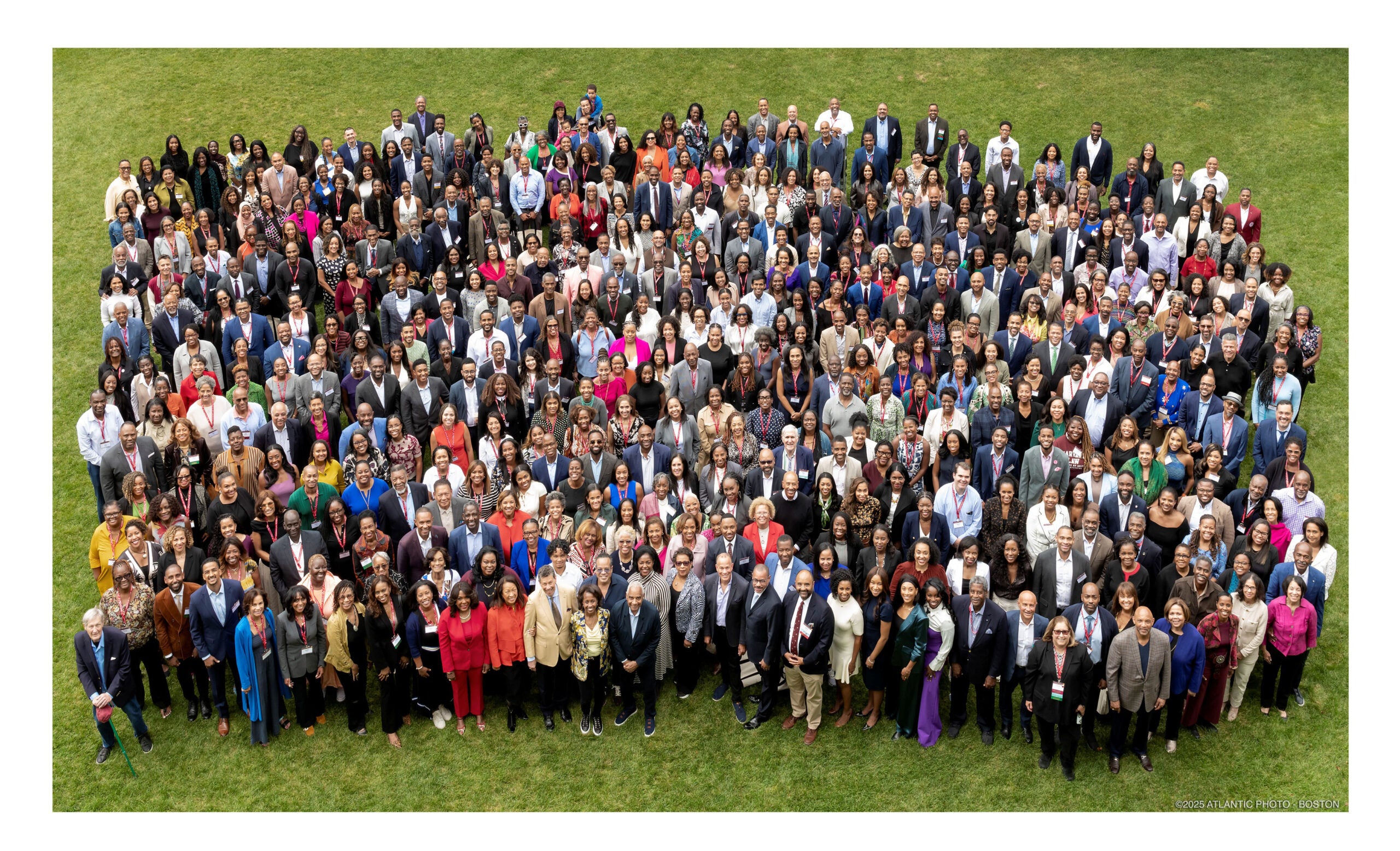
Want to stay up to date with Harvard Law Today? Sign up for our weekly newsletter.
